How Moravian Elevates the Student Experience
Eight Badges Empower Students to Stand Out
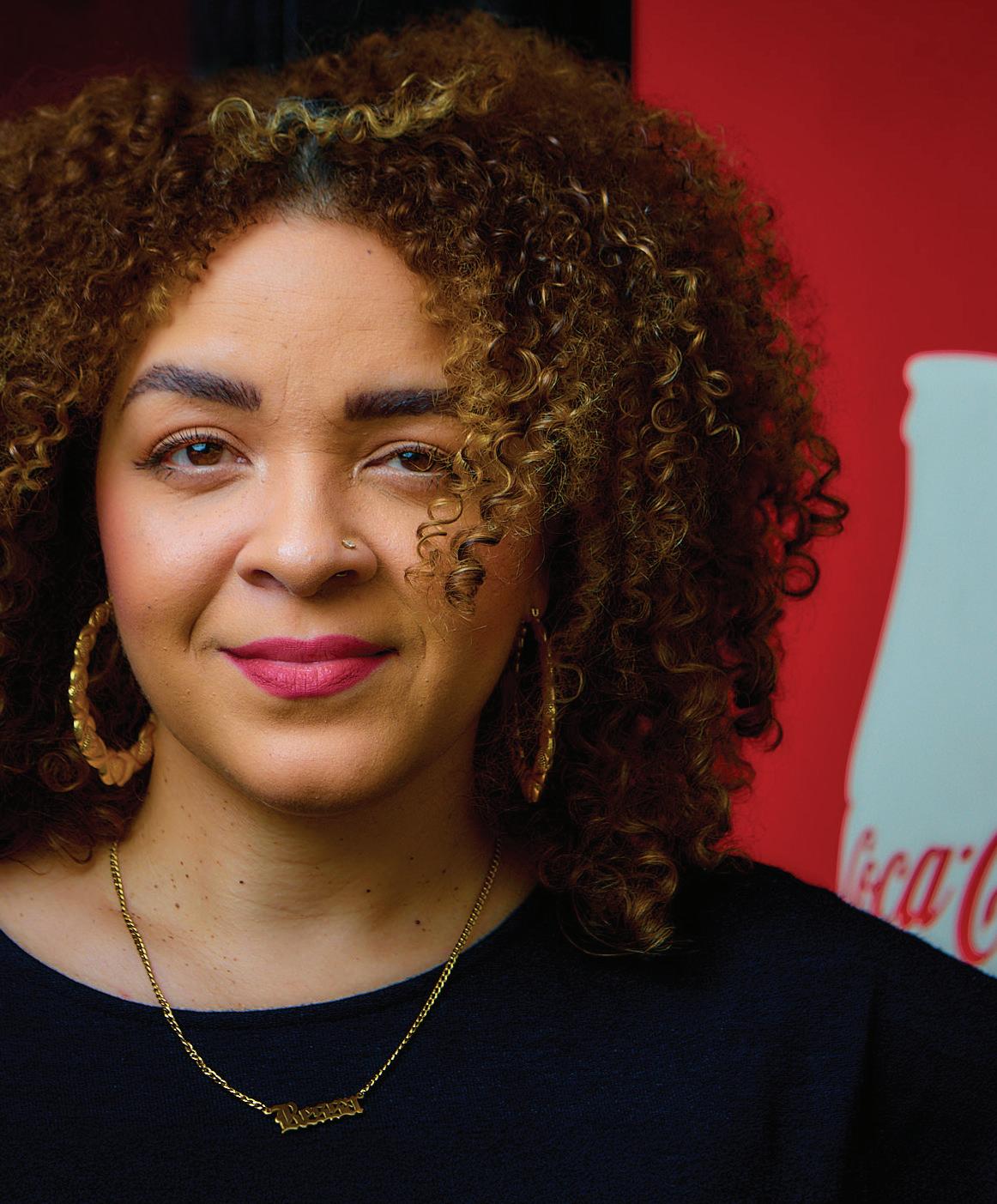

How Moravian Elevates the Student Experience
Eight Badges Empower Students to Stand Out



Editor
Christina Tatu
Art Director
Kira Dunleavy
Designer
Christine Zamora
Photographer
Nick Chismar ’20
Sports Editor
Mark J. Fleming
Copy Editor
Beth Bazar
Archivist
Cory W. Dieterly
Contributing Writers
Anndee Hochman, Renée A. James ’80, Caroline Junker, Claire Kowalchik P ’22, Steve Neumann ’94, G’18, Elizabeth Shimer Bowers, Kristen Ziegler
Contributing Photographers
Carlo Acerra, Marco Calderon, Ted Colegrove ’07, John Kish IV, John Slemp
Contributing Illustrator
GreatPetsPortraits.etsy.com
Alumni and Parent Engagement
Amanda Werner Maenza ’13, G’17
Assistant Vice President
Dylan Star
Associate Director
Kathy Magditch P’13
Administrative Support Assistant
Copyright 2025 by Moravian
University. Photographs and artwork copyright by their respective creators or by Moravian University. All rights reserved. No portion of this publication may be reused or republished in any form without express written permission.
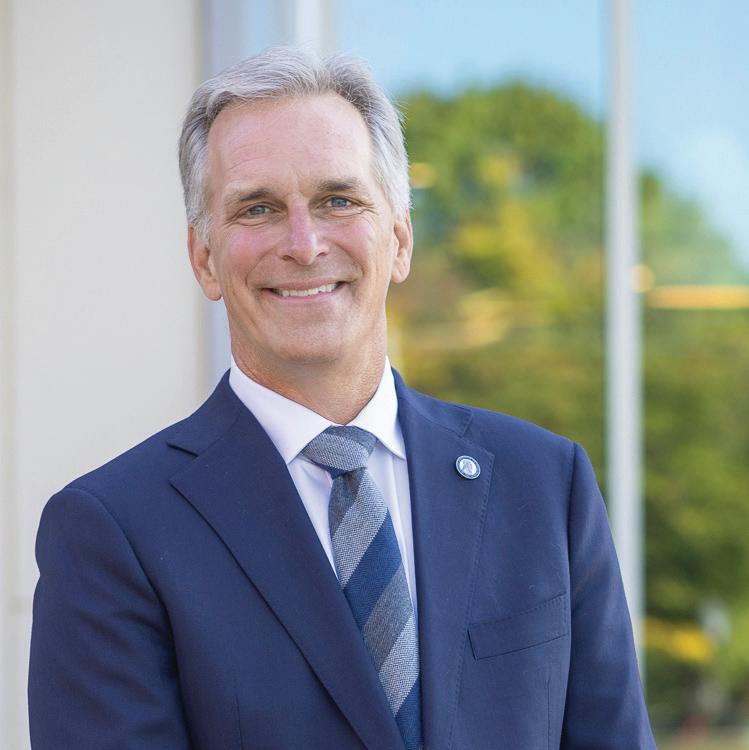
Moravian Greyhound family and friends, I hope you all are enjoying your summer and time with your family. This past academic year was one of great accomplishments, and the upcoming year shows great promise. I am filled with pride and gratitude for all the efforts that have propelled Moravian University to be a leader in higher education. Our commitment to providing a meaningful education for all has resulted in record growth, underscoring our dedication to preparing students for gainful employment, impactful lives, and leadership in a world of change.
The Elevate experience is at the heart of our educational commitment. It’s a transformative experience designed to equip our students with the skills and competencies necessary for success in an ever-evolving job market.
This issue of Moravian University Magazine is dedicated to exploring the profound impact this innovative, forward-thinking initiative is having on our students and community.
Our feature stories delve into the Elevate experience, highlighting how it integrates teamwork, leadership, global experiences, and career support into the student journey. We celebrate the achievements of five outstanding students who have earned all eight career badges, showcasing their fortitude and commitment and Elevate’s effectiveness in fostering career readiness.
Additionally, we are honored to profile Taressa Diaz, vice president of people and culture at Coca-Cola. Her inspiring personal journey and insights into the essential skills employers seek in prospective employees offer invaluable lessons for our students as they prepare to enter the workforce. Her story is a testament to the power of a Moravian education and the importance of adaptability, flexibility, and lifelong learning in personal and career success.
Moravian will continue lighting the way with opportunity and excellence for many generations of students as we consistently elevate our university and celebrate our community. Thank you for your unwavering support and dedication to our mission.
Warm regards,

President Bryon L. Grigsby ’90, P’22, P’26, P’29
12 The Real Thing
For Taressa Diaz ’11, G’16, the secret formula for her rise to a leadership role at the Coca-Cola Company began with a Moravian University course that taught her “the human side of business.”
20 Designed with Your Future in Mind
Elevate is Moravian University’s signature undergraduate experience to prepare students for life and career.
26 Eight Badges Elevate the Moravian Experience
Students who participate in Moravian’s distinctive undergraduate experience— Elevate—get a boost toward a career they love. Learn about five students who earned all eight badges during their time at Moravian. ON THE COVER
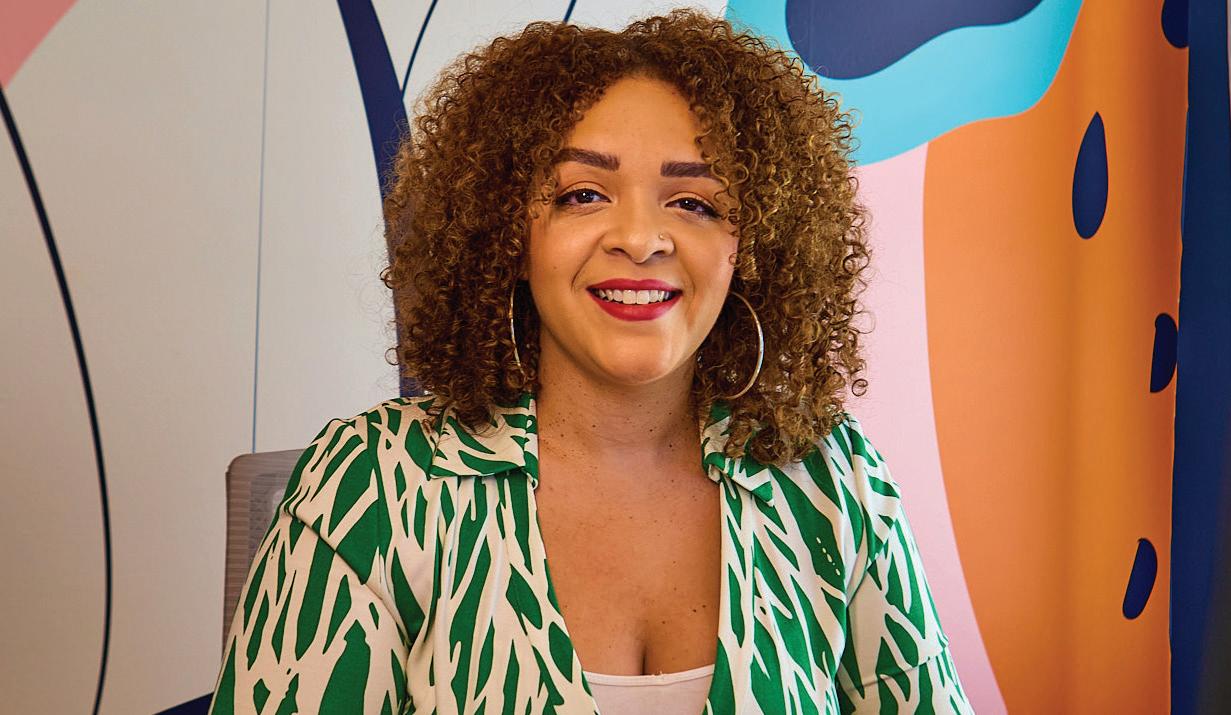
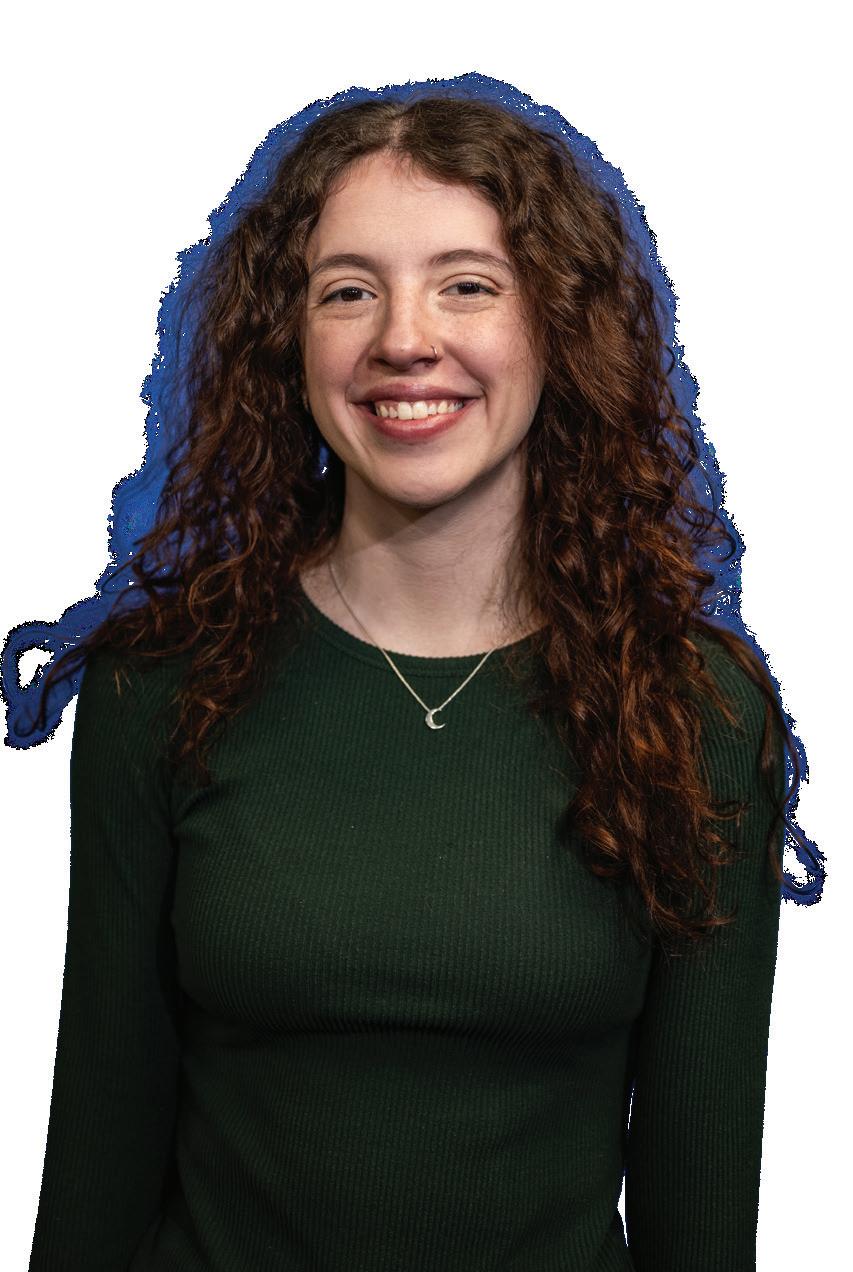


Last summer, Bethlehem and Moravian University became part of the 26th UNESCO World Heritage site in the United States—joining the ranks of wonders such as the Statue of Liberty in New York City, Grand Canyon National Park in Arizona, and Independence Hall in Philadelphia, where both the Declaration of Independence and the Constitution were signed.
On July 26, 2024, Bethlehem’s Moravian settlements—which include two university properties—along with settlements in
Herrnhut, Germany, and Gracehill in Northern Ireland, were added to the World Heritage list. They join Christiansfeld, Denmark (inscribed in 2015), as a single World Heritage site that represents the worldwide influence of the Moravian Church.
Much has happened since our local Moravian landmarks earned this prestigious designation. Here’s an update on recent developments surrounding historic Moravian Bethlehem’s World Heritage status.
Institute for Moravian History and World Heritage
Announced in April, the Institute for Moravian History and World Heritage will advance the understanding and appreciation of Moravian history and culture through academic research, education, and public engagement.
Katherine Mary Faull was named founding executive director of the institute. A distinguished scholar with more than three decades of research and teaching experience, Faull has established herself as a leading global authority on Moravian history, theology, and cultural heritage.
“Having this institute right here in Bethlehem gives our students at Moravian University an extraordinary advantage— they’re literally studying and conducting research at a UNESCO World Heritage site. This isn’t just about reading history in textbooks; it’s about engaging with living heritage in their own backyard,” Faull says. “For our community, the institute represents a bridge between our remarkable past and our vibrant future, ensuring that the innovative spirit that built these settlements continues to inspire new generations of learners, leaders, and global citizens.”
A cornerstone of the institute’s mission will be serving as a central hub connecting all four Moravian Church settlements through collaborative research initiatives, cultural exchanges, and shared digital resources. As a semi-autonomous institute within Moravian University, it will promote interdisciplinary learning, cultural preservation, and international scholarship, positioning the university as a center for Moravian heritage, research, and education. The institute is housed on the university’s Bethlehem campus and will begin offering academic courses early in 2026.
Bethlehem’s Moravian Church settlement locations span more than 10 acres in North Bethlehem. The university owns the 1768
Widows’ House, now used as residences for faculty and staff, and the 1748 Second Single Brethren’s House, home to the university’s music department. Both are located on West Church Street. Making sure the sites are accessible to visitors near and far is the goal for leaders, both in the city of Bethlehem and at Moravian University.
These World Heritage locations provide valuable insight into the architecture, art, town planning, and industry that the Moravians brought to Bethlehem when they settled here nearly 300 years ago. In addition to advocating for universal education, the Moravians established in Bethlehem a town center with distinctive stone buildings, a grand church sanctuary, and the first municipal water system in America.
Since last summer, the website MoravianChurchSettlements.org was launched, providing an overview, descriptions of all four sites, photographs, videos, and news. The Moravian story has also reached a global audience through print, online, and on television—including a PBS News Hour feature.
A visitor guide, complete with a map of the 10-acre Bethlehem designation and a self-guided tour, has been created, along with a 32-page World Heritage brochure for stakeholders and potential partners.
One year after Bethlehem’s Moravian Church settlements earned World Heritage status, the celebration continues with events honoring the special recognition. A free block party and community festival will be held from 11 a.m. to 7 p.m. on September 6 at Central Moravian Church, Church Street, and around Bethlehem City Hall.
The celebration will begin with an opening ceremony at Central Moravian Church along Main Street, featuring a presentation of the UNESCO World Heritage recognition plaque.
“ For our community, the institute represents a bridge between our remarkable past and our vibrant future, ensuring that the innovative spirit that built these settlements continues to inspire new generations of learners, leaders, and global citizens.”
Katherine Mary Faull, executive director of the Institute for Moravian History and World Heritage
Throughout the day, visitors will be able to explore the World Heritage site and its nine locations. The event will feature multiple stages with musical performances by local bands, the Moravian Trombone Choir, the Central Moravian Church Choir, and the Bach Choir of Bethlehem. The day will culminate with a community Lovefeast—a Moravian service of worship and fellowship that includes a simple meal shared by the congregation.
Historical demonstrations will transport visitors back in time with live displays of traditional Moravian crafts and industry, including blacksmiths at the forge and candle making. There will also be food trucks, children’s activities, and local vendors.
For more information, visit MoravianChurchSettlements.org.

Rosania Harvie Named Arts Educator of the Year
MaryJo Rosania Harvie is among the 2025 Linny Award winners, announced by the ArtsQuest Foundation earlier this summer. The awards recognize outstanding contributions to art education and a lasting impact on students, colleagues, and the broader Lehigh Valley arts community.
An assistant professor of art and the art education coordinator at Moravian University, Rosania Harvie has an EdD in transformational teaching and learning from Kutztown University and an MFA from the Vermont College of Fine Arts. She is certified in K–12 art education, grades PK–4, and school administration in Pennsylvania and New Jersey.
A practicing artist, Rosania Harvie is also a teaching artist at the Banana Factory in Bethlehem and a Pennsylvania Council on the Arts rostered artist. Her studio work includes an interdisciplinary exploration of identity through various mediums.
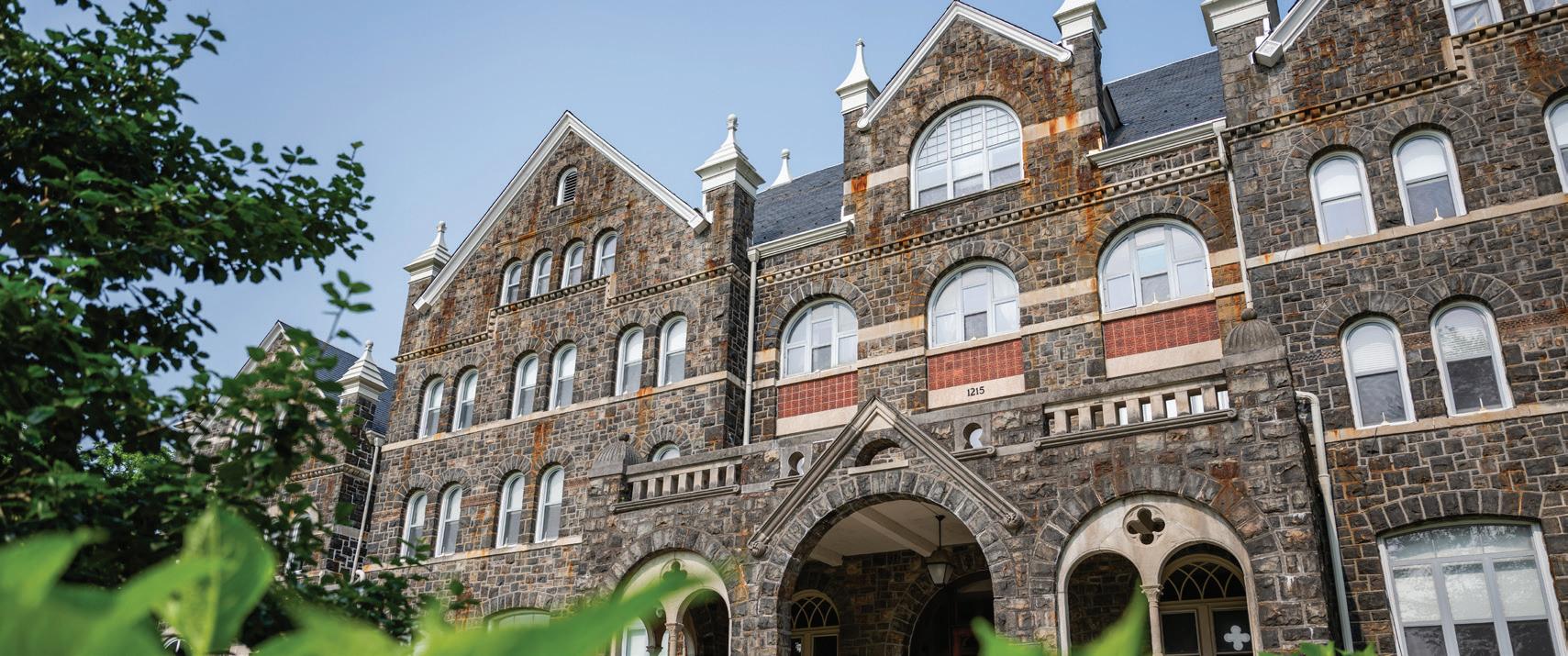


Her academic scholarship focuses on the impact of past experiences and relationships on educator identity and practice, and she is currently exploring the power of art education to build and sustain cultures of community, collaboration, and belonging. Rosania Harvie serves on the board of the Pennsylvania Art Education Association and as a member of ArtsQuest’s visual arts board.
“For me, this award celebrates all of my students, colleagues in education, and the future teachers I have the honor to work with,” Rosania Harvie says.“It is a reminder that the arts are essential for all of us throughout our lives, and I am beyond grateful and very proud to represent art education with the Linny Award.”
The Linny Awards are named after the late Marlene “Linny” Fowler, a stained-glass artist and community leader who supported artists and arts organizations throughout the Lehigh Valley for more than a quarter
century. The awards will be presented in October at the MusikFest Café in the ArtsQuest Center.
Moravian Secures $40,000
It’s On Us Grant
Moravian has been awarded a $40,000 grant from Governor Josh Shapiro’s office and the Pennsylvania Department of Education as part of the 2024–25 It’s On Us PA initiative. The grant bolsters the university’s ongoing efforts to support an array of campus-wide measures focused on awareness and prevention of, reporting on, and response to sexual violence. The initiative was inspired by the national movement launched by the Obama administration and aims to raise awareness about sexual assault, educate communities on recognizing and preventing sexual assault, and empower individuals to take action. Moravian is among 44 institutions in Pennsylvania to receive this funding, which collectively totals more than $1.6 million.
Moravian to Host First Certified Information Systems Security Professional (CISSP) Boot Camp
In partnership with ISC2, Moravian will host a boot camp designed for information security professionals ready to demonstrate their expertise in cybersecurity strategy and implementation. Sessions will take place via Zoom from 8 a.m. to 4 p.m. over two three-day weekends: September 12–14 and September 19–21. The boot camp prepares individuals to earn CISSP certification—the cybersecurity industry’s gold standard—by helping participants review and refresh their knowledge and identify key areas to study. For more information, visit the Moravian CISSP website.
Moravian Offers First Associate’s Degree
Moravian has partnered with CG Spectrum, a global leader in online education that delivers expert-level training and industry upskilling in animation, visual effects, digital arts, and game development. Launching in Fall 2025, the first programs will include game design, 3D modeling, and concept art, with additional specializations in development. Students who complete the program will earn an associate of applied arts degree. Each fully online course is designed to deliver practical skills, personalized mentorship, and industry connections.
Moravian’s nursing and speech-language pathology programs moved up in this year’s U.S. News & World Report rankings.
The speech-language pathology program made a leap from its 2024 ranking of number 159 all the way up to number 120 in the Program and Specialty rankings, while the Helen S. Breidegam School of Nursing climbed 23 spots from number 147 to number 124 in the Best Nursing Schools: Master’s category. In case you missed it, Moravian was also named one of the Best Nursing Master’s Programs for Your Money for 2025 by Money.
In its fourth year, the Reed Raymond ’74 College Readiness Program welcomed 18 young men as its 2025 cohort, along with, for the first time, 14 young women as part of a new “Empowered Female Futures” track. Founded to support the high school–to–college transition of students primarily from the public school districts in Allentown, Bethlehem, and Easton, the program continues to see youth graduating from high school and enrolling in colleges and universities.
“The value of the Reed Raymond ’74 College Readiness Program extends well beyond college planning,” says G. Christopher Hunt, founder of the program.“It immerses students in a five-day residential experience on a college campus where they live in dorms, attend workshops, connect with peers, establish mentoring relationships, and engage in thought-provoking dialogue.” Those interested in learning more may reach out at collegereadiness@moravian.edu.
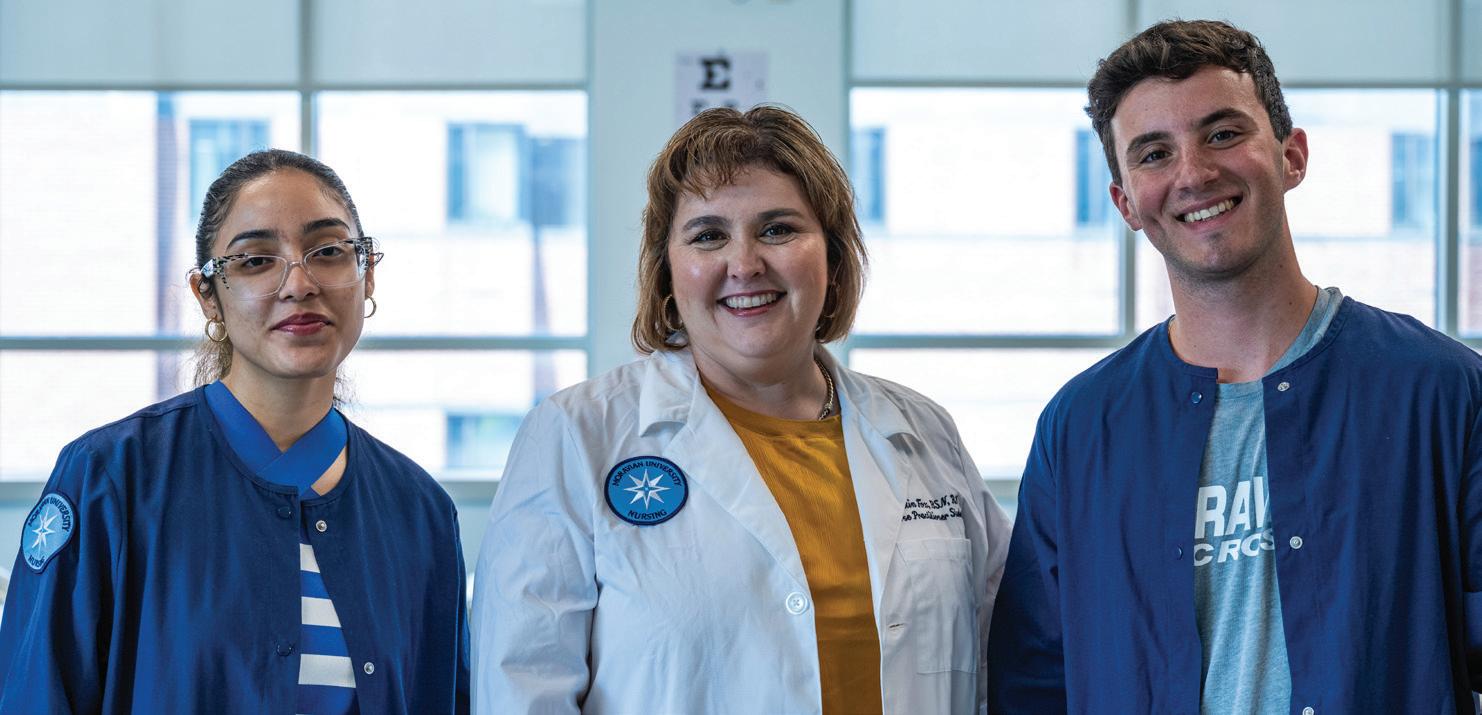
EXCITEMENT CONTINUES FOR THE NEW HAUPERT UNION BUILDING.
On June 6, members of the media were given a hard-hat tour of the 70,000-square-foot, four-story facility where student wellness, mental health support, and academic and career resources will take center stage. Affectionately known as the HUB, the building is expected to open this fall.
Featured in the Media Media outlets that attended the tour and posted stories include The Morning Call, Lehigh Valley Live, Lehigh Valley News, and WFMZ-TV’s 69 News
Tour Leaders
President Bryon Grigsby, Chief Financial Officer Mark Reed, Dean of Students Nicole Loyd, and Brittany Dewar of Warfel Construction participated in the tour, providing insights into Moravian’s vision for a student-centered environment that will integrate physical and mental health services with student life and support.
From Then to Now
The original facility dates back to 1962, when it was called the CUB, for College Union Building. Over the years, the building has been added to and renovated many times. The latest expansion and renovation is the most extensive to date. The changes are to keep up with the needs of Moravian’s growing student population.
Learn more: https://news.moravian.edu /2025/06/06/moravian-university -previews-wellness-focused-student -center-opening-fall-2025/

Moravian junior and pitcher/right fielder Sarah DeStefano has been honored with a spot on the 2025 National Fastpitch Coaches Association Division III All-America Second Team, announced at the 2025 NCAA Division III Championship Finals banquet in Bloomington, Illinois.
DeStefano helped the Greyhounds to a 40–9 record this season. Her award gives Moravian a total of 10 student-athletes who have received 14 NFCA All-America honors. She is the fourth Greyhound pitcher to be selected as an All-American.
This spring, DeStefano was selected as the Landmark Conference Pitcher of the Year while making All-Conference First Team as well as the NFCA All-Region V First Team. She is a two-time NCAA Division III Regional Most Outstanding Player, garnering the award at the 2025 Bethlehem, Pennsylvania, and 2023 Medford, Massachusetts, regionals. DeStefano recorded a 1.07 earned run average this season in the circle with a 22–4 record, 10 shutouts, a save, 24 complete games, and 142 strikeouts in 177, and she had a .392 batting average with 31 hits, six doubles, two triples, and 21 RBIs at the plate. She also had 33 putouts and 49 assists in 82 chances in the field this spring.

Moravian University Director of Athletics & Recreation and Head Women’s Basketball Coach Mary Beth Spirk was selected as one of the 28 winners of the 2024–25 National Association of Collegiate Directors of Athletics AD of the Year Award.
The award highlights the efforts of athletics directors at all levels for their commitment and positive contributions to student-athletes, campuses, and their surrounding communities.
Spirk arrived at Moravian in October 1981 as an assistant women’s basketball coach. She has won nearly 650 games as head women’s basketball coach in 37 seasons, in addition to serving as director of Athletics & Recreation since June of 2017.
“I am honored to accept this award on behalf of the hardworking men and women in the Moravian University Athletic Department who have dedicated their professional lives to the work we do—using intercollegiate athletics to develop character, teamwork, and leadership skills in the thousands of student-athletes we serve,” Spirk says.
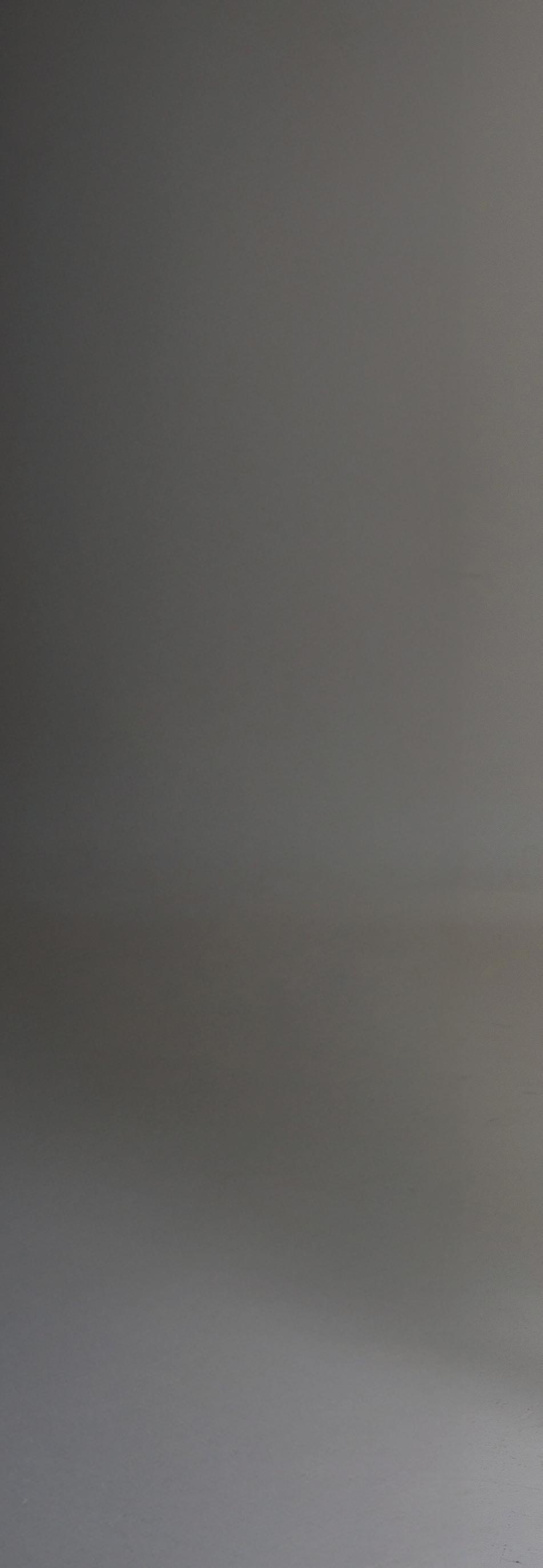
The softball squad made their 21st appearance in the NCAA Division III Tournament, hosting a Super Regional for the first time at Blue & Grey Field on May 23–24.
The women’s track & field team won the 2025 Landmark Conference Outdoor Championship, while the men’s team finished as runner-up.
Margie Rayne ’26 and Anthony Morillo ’27 were the Female and Male Outdoor Field Performers of the Year.
Jason Koch ’25 was the Landmark Conference Men’s Golf Player of the Year.
Jackie Salvatore ’25 was selected to the 2025 USA Lacrosse Magazine Honorable Mention All-America Team. This past season she scored a school record 120 points and set Landmark Conference records with 201 assists and 379 points in her career while named the Landmark Conference Offensive Player of the Year for the second straight spring.
“ As soon as I’m on the field, I’m just happy to be there. Once that whistle blows, I’m locked in on the ball or someone I’m defending against, and my heart keeps pounding and energy keeps on flowing and flowing and flowing.”
—Kyle Weiss ’25
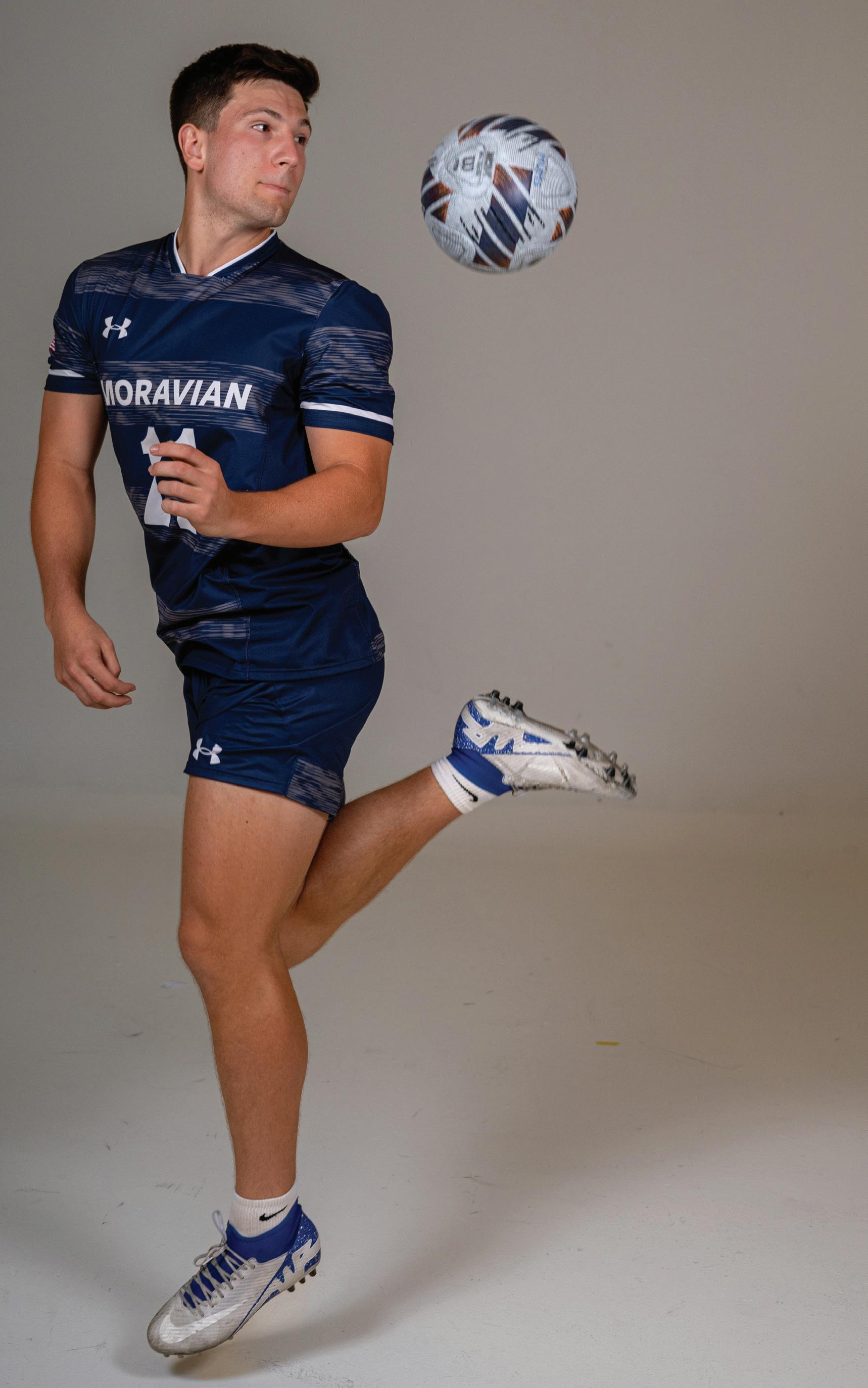
Kyle Weiss ’25 has been playing soccer since he was 2 years old, and along the way to today, he’s also competed in football, lacrosse, basketball, and swimming. Still, he graduated in the top 10 percent of his class. At Moravian he committed to four years of soccer and lacrosse, and as a junior and senior, he’s run the 200, 400, and 4x400 in indoor track & field.
“I love to compete,” says Weiss.“I love to push myself as far as I can, and when I put my mind to a goal, I just have to get it. If I don’t make it one season, I have another season. And when that season’s over, I have another. I think, progressively, I’ve just chased after my personal best for 20-plus years. My role model is me five years down the road or me next season.”
And what does it feel like to compete?
“As the start gets closer, you get the butterflies, get nervous. The nervousness turns into energy and your heart beats faster, and it’s like you’re souped up on a bunch of coffee and you’re ready to go, and once you get out there—it’s pure bliss.
“As soon as I’m on the field, I’m just happy to be there. Once that whistle blows, I’m locked in on the ball or someone I’m defending against, and my heart keeps pounding and energy keeps on flowing and flowing and flowing,” Weiss says.
“When you achieve that tackle or goal, it’s all worth it,” he adds.“You’re dripping sweat, and everyone around you is celebrating, and it reenergizes that battery even when you’re at your limit.”
Weiss competes on a semiprofessional soccer team. He will return to Moravian for a master’s in education because as an educator, he can also coach.
“In some way, I have to be around sports.”

Talking music with Nina Worsley ’25 and Calvin Deifer ’26 opens up a world filled with commitment, dreams, discipline, and beauty. Both music composition majors, they each have pieces that premiered on October 29, 2024, at the New Chamber Music Concert, part of a series produced by the Allentown Symphony Orchestra. Since inaugurating the competition in 2020, the symphony has received nearly 400 submissions from composers living around the world. Worsley and Deifer are in very good company.
Worsley, who grew up in a musical family, laughs as she notes that iPads and iPhones weren’t quite as ubiquitous back then as
“ Music majors don’t choose to be music majors. It’s a calling ...like from God? Something personal inside you? For me, I need to do it—it’s almost like a drug.”
—Calvin Deifer ’26
they are for young people today. When her schoolwork was finished, she would sit at the piano “making stuff up! I guess my initial draw to music was boredom!”
Worsley composed her first “structured” song at age 14. It was “the first thing that made me feel like a ‘creative,’” she says, “and that what I wrote was identifiable.” For the upcoming concert, she worked with Larry Lipkis, professor of music and composer-inresidence, on an energetic piece, somewhat lighter and different from the spiritual and religious tones she more often favors.
“ ‘A Childhood Spring’ was originally part of a series I started where I’d take songs I wrote as a child and update them. ...I struggled a lot with depression in early childhood, and music was my way of making sense of my emotions. So, going back to my old music, I realized a lot of it had that heavy, dreary emotion behind it. I didn’t want to cement that negativity into my history, because in spite of complicated emotions, I found a lot of joy. So I decided to pivot to that joy, and cement it into history so it wasn’t forgotten.”
Deifer arrived at Moravian with a solid instrumental background (piano, trumpet, tuba, and bass guitar), although he acknowledges, “It wasn’t to the extent of a lot of composition majors here.” While he was always drawn to music, it was later in high school when he realized he wanted to focus on music in college.
Regarding his commitment to composition, it’s much more than a course of study. He agrees with the way a friend and fellow
Calvin Deifer and Nina Worsley find their inspiration in any number of pieces they hear. When asked, “What do you wish you had composed?” they shared the following:
Worsley: “This is totally random, but I’m very serious: the soundtrack to Finding Nemo. I watched it recently and realized that everything that was happening in the music was helping me feel the emotions of the story. So powerful— you almost don’t need the dialogue!”
Deifer: “I listen to a lot of jazz, especially by arranger Gil Evans, who worked with Miles Davis and others. He was famous for his unconventional voicings in big band music. He creates beautiful chords—the ‘king’ of weird, crunchy, totally beautiful chords. I also love the music of Japanese composer Joe Hisaishi.”

musician describes it: “Music majors don’t choose to be music majors. It’s a calling ... like from God? Something personal inside you? For me, I need to do it—it’s almost like a drug.”
As a younger musician, he composed a piece titled “Triumph,” which he laughingly recalls as “horrible—awful— the arrangement was terrible.” So he particularly appreciates his studies with Chase Morrison, instructor of cello, composition, and theory at Moravian, who helped him focus on “articulations, dynamic markings ...small things you don’t think about while composing, but they’re all very important.” He’s also learned that when it comes to writing music, “You just gotta do it—don’t hesitate. No judgment. If you don’t like it, you adjust it. You can learn by doing.”
Deifer’s chamber music piece Scoundrel Sonata was inspired by an annoying labradoodle named Ziggy, his parents’ dog, which didn’t seem to like him very much and was nothing but irritating. During one
particular dog-sitting job, Deifer dealt with his frustration through music and composed what turned out to be Scoundrel Sonata.
Lipkis notes that all the composition students have diverse interests, and that gives breadth to what they do. “I’ve been teaching composition at Moravian University for nearly 50 years, and I find it endlessly rewarding. My students have a plethora of diverse backgrounds and styles of composition, and my job is to nurture them by giving them guidance on ways to develop their ideas. Since the inception of the New Chamber Music Concert, six of my students have had their works performed. We also present an annual concert of works by student composers, and they rally to support each other and their variety of styles.”
Congratulations to Deifer and Worsley on their success. Our world will become a more beautiful place as they contribute their musical gifts to it in the years to come.
—Renée A. James ’80
For Taressa Diaz ’11, G’16, the secret formula for her rise to a leadership role at the Coca-Cola Company began with a Moravian University course that taught her “the human side of business.”
By Anndee Hochman
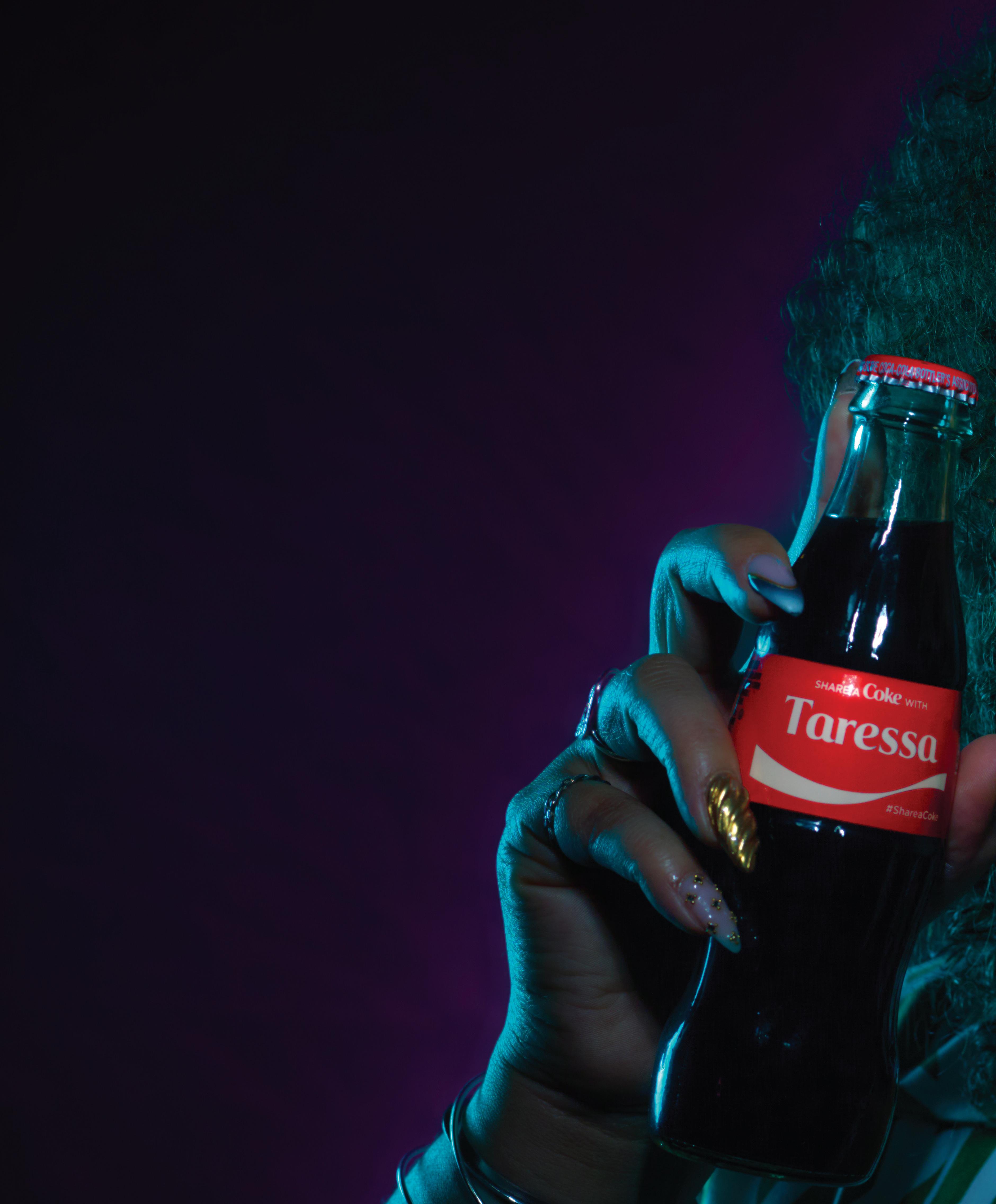


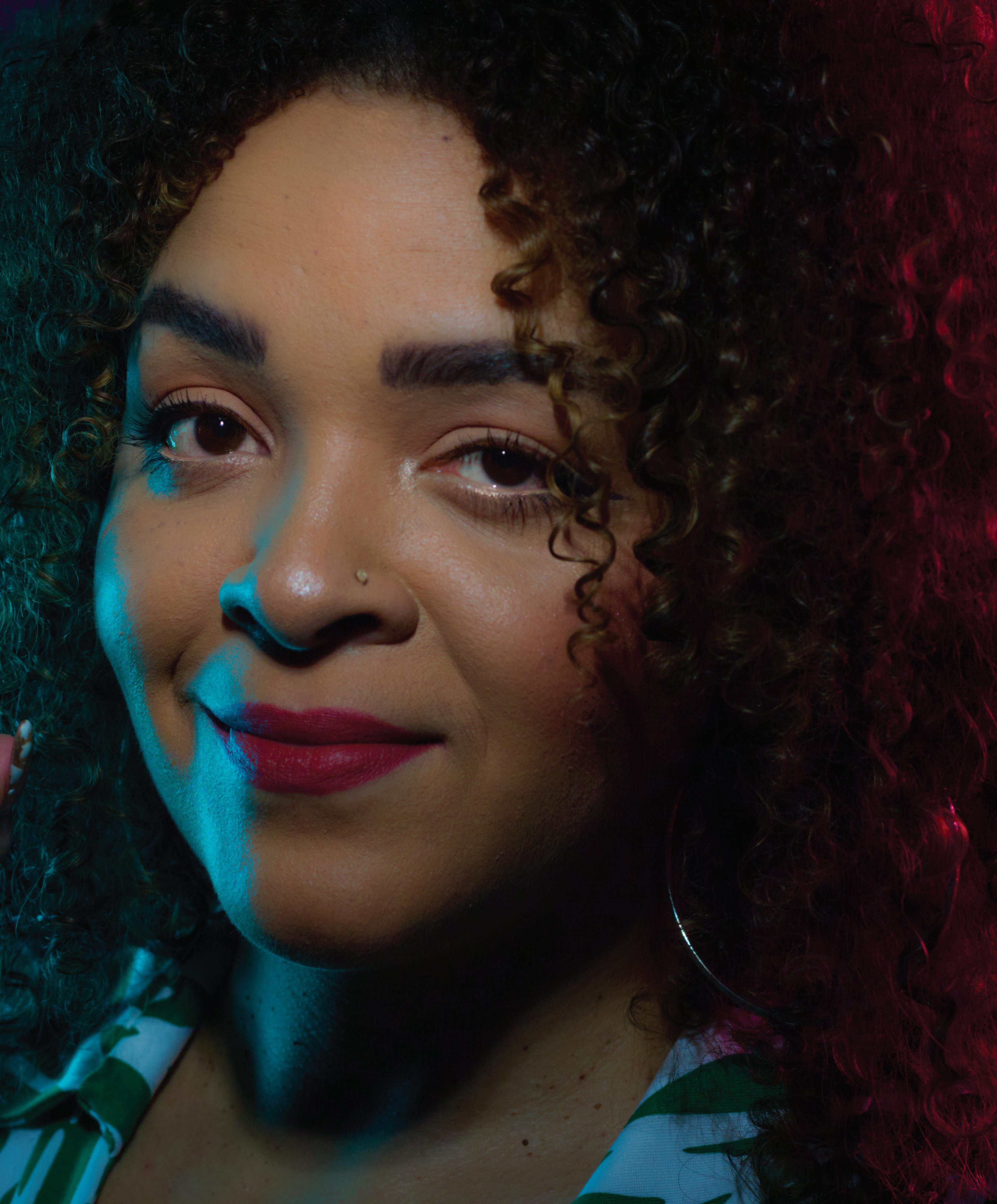

After her first job interview at the Coca-Cola Company, for a position as a human resources manager at the company’s syrup-making plant in Allentown, Taressa Diaz climbed into her car, burst into tears, and called her mother.
“I bombed it,” she sobbed.“I was stumbling. I didn’t answer things right.”
For Diaz’s mother, it was a familiar litany. This was the daughter who had anxiety spikes before high school exams, then inevitably came home with A-level work; the young woman who spent springtime Saturdays in the college library so she could go out at night.
“I tried to encourage her,” Minerva Diaz remembers.“I said,‘I’m sure you did fine.’ And then she got the job.”
For Taressa Diaz, that 2016 moment both launched her career at the Coca-Cola Company and encapsulated her path from a coarse neighborhood and an under-resourced public high school to a Fortune 100 company.
At every step of that journey, she’s been propelled by a fierce work ethic, high expectations of herself, and a drive to achieve.“I had this intense fear of failure,” she says.“I felt like whatever I did, I had to be successful. I was so afraid of not making it out of the cycle I’d seen others around me stuck in.”
Minerva Diaz was a senior in high school when she became pregnant; she was 19 when her daughter was born. The pair lived in subsidized housing and, at times, relied on food stamps. The neighborhood wasn’t frightening, Taressa remembers, but it was rough, with frequent fights.
In elementary school, Taressa was placed in gifted classes, a boon for her hungry mind but one more reason to feel apart from other students. By the time she reached William Allen High School, with 35 students packed into a room, limited resources, and teachers who, Diaz says, sometimes made questionable remarks, she occasionally ducked out of classes.
In 10th grade she auditioned for William Allen’s dance academy, an intensive program that involved three hours of dance each day. “The arts saved me,” Diaz says.“In order to stay in dance, you had to keep your grades up.
“One of the things I love is being able to connect with people from around the globe. I love the ability to work closely with leaders to develop a people strategy that is in support of their vision for the business.”
You couldn’t get suspended. That was such a motivator.” The dance teacher, Renee Lorenzetti, became a cheerleader for Diaz and her classmates. “She clearly loved her job, and she didn’t give up on you,” says Diaz. “She cared about the role she played in her students’ lives.”
At the same time, Diaz’s mother, aunts, and grandmother were models of resilience and resourcefulness. Diaz’s grandmother raised 10 children on her pastor husband’s modest salary and always made her home a refuge for family members.
Taressa’s mother, a savvy shopper, would find Guess jeans on sale for $7 so her daughter could dress like her peers. More importantly, Minerva offered encouragement and stability, cheering at Taressa’s dance performances and insisting on a strict routine: homework before playtime; church on Sunday; always saying “please” and “thank you.” “My mom overcame a lot in her life and always made sure I had what I needed,” Diaz recalls.
While still a teenager, Diaz began passing that grit and generosity forward. She became part of a youth coalition that created Xcape Urban Creative Arts Center, which offered free after-school dance, spoken word, and acting classes to local youth. “That was really meaningful to me, to be part of something that was giving back.”
Diaz knew a college degree was essential, but there was no nest egg to pay tuition. She worked her way through Lehigh Carbon Community College—with the job at Xcape, plus stints at a Forever 21 store in the mall— earning an associate’s degree in three years.
She transferred to Moravian as a sophomore, starting as a commuting student and working 25 to 30 hours a week at the Lehigh County courthouse, where her mother also worked. By junior year, Diaz lived on campus. “One of the reasons I was keen on Moravian was because of its size,” she says. “It truly felt like a community.”
Diaz planned to study sociology; she imagined replicating the programs of Xcape Urban Creative Arts on a larger scale. But a
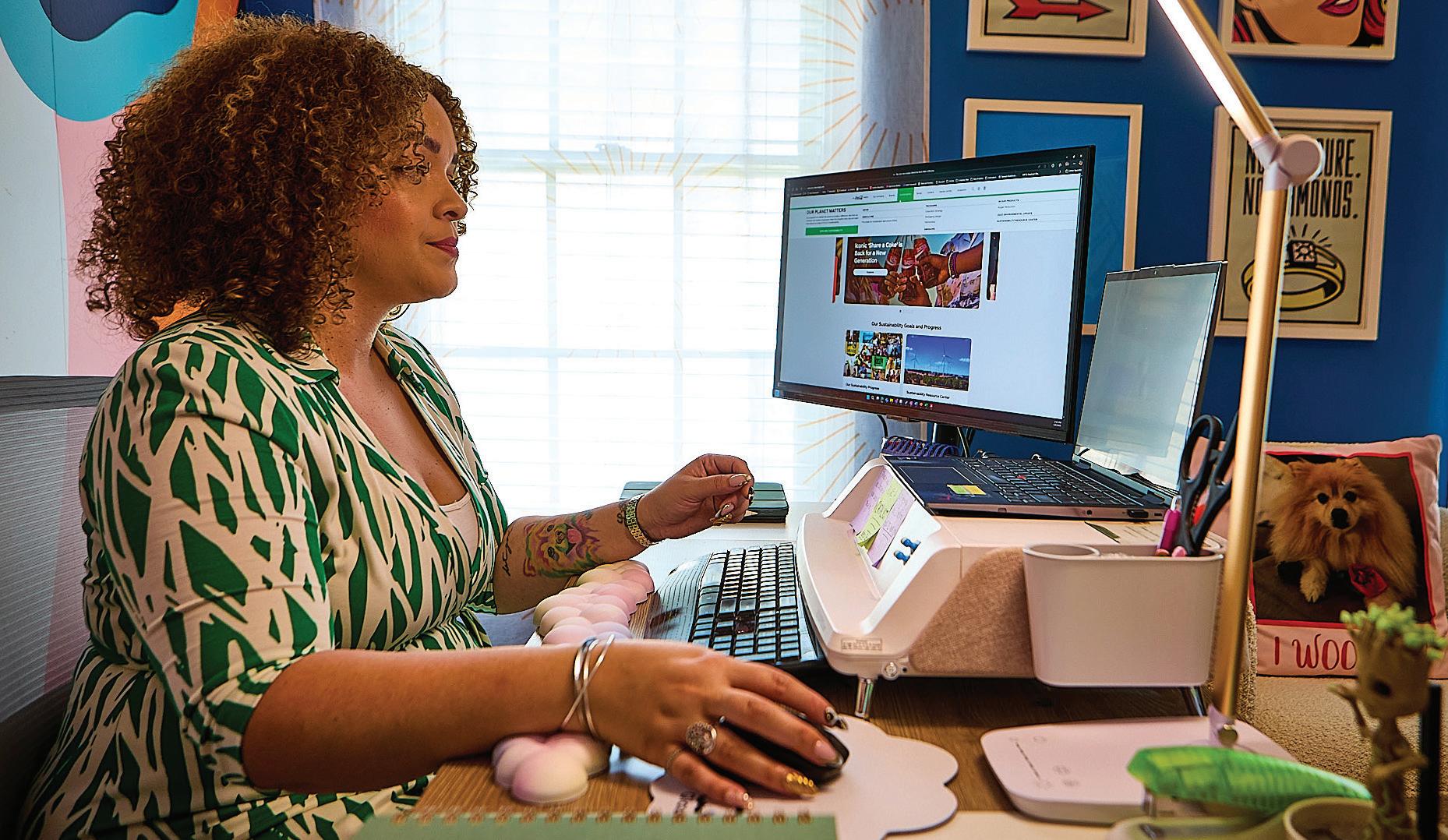
class in industrial organizational psychology changed her perspective. “It showed me the human side of business,” she says. “I saw how you could make a difference in employees’ lives, how you could shape the work experience, and how that could drive business results.”
She added a minor in business management and resolved to make a career in human resources.
Virginia Adams O’Connell, chair of the Department of Sociology and Anthropology, taught Diaz in a basic research methods class. “She was an outstanding student,” O’Connell recalls. “No matter what we talked about, Taressa’s eyes were bright, she was focused, she was willing to engage in the conversations.”
While other students craved simple answers to difficult problems in sociology, O’Connell says, Diaz embraced nuance and was curious about the delicate relationships between business and government, between cultural assumptions and individuals’ experiences. “Even at that young stage in her undergraduate career, she enjoyed sitting with the puzzles, the complexity.”
A paper of Diaz’s, an analysis of cultural beauty standards titled “The Cost of Beauty: Dollars or Sense?” so impressed O’Connell that she encouraged her to submit it to the Eastern Sociological Society Annual Conference during Diaz’s senior year. Diaz was the only undergraduate to present at a roundtable there.
Diaz remembers it vividly. “I’d never been in a setting like that before, among other academics. I was very proud.”
Both in and out of the classroom, O’Connell says, Diaz showed grace to others while excelling as an intellectual force. “She had a way of encouraging others to bring their best to the table.”
After graduating in 2011, Diaz worked for five years at PPL, using the company’s education assistance program to earn her master’s degree in human resource management
from Moravian. In some ways, that job felt like the apex—or at least an apex—of a hard-earned climb.
“It’s not like I felt I’d ‘arrived,’ but I’d already gone further than I thought I could go,” Diaz says.
That is, until she landed that first human resources job at the Coca-Cola Company. In December 2018, she moved to Atlanta, by herself, with her dog, to take on a role as human resources director for one of Coca-Cola’s global functions. “It was a leap of faith,” says Diaz. “I had never lived outside of Allentown, let alone in a different state, 700 miles from family. But I knew this was the right career move for me, and I wanted so much more for myself. It felt right.”
Suddenly, she was working for a 20,000-person company with global reach and a century-plus history, a place where her career could flourish.
“I felt like I saw possibilities,” Diaz says. “[Here], there are more people who look like me in senior leadership roles. By getting to know some of them, I started to feel like ‘Oh, this is possible.’ ”
In 2021, Diaz applied for a new job at the company, working with a team responsible for talent innovation—corporate-speak for clarifying and cultivating the skills, knowledge, and capacities of employees to grow within the company.
Tapaswee Chandele headed that team.“I was looking for someone super open-minded, very commercially savvy, who could work independently,” Chandele says.“Taressa leans into adversity; she was the best candidate in a broad range of people.”
Over the nearly four years that the two worked together, Chandele says, Diaz helped answer questions such as, “How is work changing? What does it mean to have a career at the Coca-Cola Company? How do we measure performance?”
Diaz, she says, excelled at listening to reports from across the company’s global

“I saw how you could make a difference in employees’ lives, how you could shape the work experience, and how that could drive business results.”





network, changing her perspective in response, and maintaining her cool even in tense situations.
“She always starts with assuming best intent,” Chandele says. “She naturally draws people in.” Diaz returns the praise, citing Chandele as a leader who offered steady coaching and support while allowing her the latitude to solve problems on her own.
In 2022, as global director of talent innovation and careers, Diaz joined with her colleagues in launching a career strategy
that focused more on employees’ skills and experience than on the specific roles they would need to advance. For instance, she says, if an employee aims to be chief marketing officer, rather than mapping a trajectory of job titles to reach that goal, they could think instead about the capabilities they need—work experience in both developed and underdeveloped markets, excellent communication skills— and how they could grow those through various jobs and departments.
Last November, Diaz landed a new job at the Coca-Cola Company, as vice president of people and culture for global digital and
technology services—which means that she heads human resources for more than 1,000 employees worldwide, all of whom are engaged in leading the data, digital, and technology transformation of the company, including AI experimentation in marketing.
“One of the things I love is being able to connect with people from around the globe,” Diaz says. “I love the ability to work closely with leaders to develop a people strategy that is in support of their vision for the business.”
She still draws on the “aha” she had in that industrial psychology class as an undergraduate: that connecting with and cultivating human resources is integral to helping a business thrive. Diaz treasures a recent moment when she spoke with an employee who, after 14 years with the company, noted that in all that time, past HR partners had not dedicated the one-to-one connection time that Diaz had. “That person felt seen; they felt valued. It showed me that the work I do does make an impact.”
Diaz recalls another time, in her previous job at the company, when she hosted a table with swag and information during Global Career Month. A woman approached to say that she had previously worked at the Coca-Cola Company, then left, but had returned after learning what the business was now doing to help employees grow in their careers.
“To know that what I did was part of what brought her back to the company—that was a really clear indicator that what I was doing was working,” Diaz says.
Though based in Atlanta, Diaz remains connected to Allentown, where her mother still lives, and to Moravian. As board chair of the Cohesion Network, a nonprofit focused on youth development and community education in the Lehigh Valley, Diaz proposed that Moravian students could work with Cohesion for their capstone projects, which involve examining real-world problems faced by businesses and organizations.
Sometimes, Diaz says, her life feels like a series of pinch-me moments: Really, I’m on a gondola in Venice with my mother, on a weeklong trip to Italy for which I paid the bill? Truly, I own a home? I’m a VP at the Coca-Cola Company at age 37?
“When I think of those moments, the 21-year-old in me would not have believed that was possible, and would be proud,” she says.
Today, she would have advice for that 21-year-old: Slow down. Chill out.“I was so hyperfixated on all the things I needed to get done; I do feel like I lost some time when I could have slowed down a bit to smell the roses.”
She tries to do that now. When not working, she loves spending time with her Pomeranian, Mia. Diaz frequents art exhibits and concerts and takes her mother on an annual vacation; the two still talk or text nearly every day. Diaz grew up in the church, and Christian values remain a touchstone. “If I’m going through a hard time in my life, I’ll shoot a text to my family to ask them to pray for me.”
For years, Diaz’s vision of success was a single-minded one: Move steadily up the corporate ladder. Now her view is more holistic.
“Success to me means contentment with where I am in my life,” she says.“Being able to be present for those around me, being able to make a positive impact through the work I do and in the relationships I have, and being able to give back.”
In her former position as global director of talent innovation and careers for the Coca-Cola Company, Taressa Diaz thought a lot about the big-picture world of work: What will jobs look like in 10 years, or 50 years? What kinds of skills and capacities will workers need?
“We did extensive internal and external research to understand: Where is the future of work going? How does that shift the way we think about growing and developing talent?” she says.
One conclusion her team drew is that jobs change more rapidly than they used to, largely because of shifting technology. Rather than grooming themselves for particular roles, Diaz says, workers need to think about the capabilities, knowledge, and experiences that will help them succeed.
Diaz says these include
● Technical expertise with the software and platforms being used in your field; a willingness to stay abreast of new technologies, including AI.
● Complex problem-solving and critical thinking skills.
● Adaptability. “With all the socioeconomic changes, all the political shifts that impact how we work and connect with one another, we need to continue to sharpen our skills around being resilient through it,” she says.
● A global perspective. Even if studying or living abroad is out of reach, Diaz says, it’s important to cultivate a network of people from different backgrounds and parts of the world in order to understand cultural nuances.
The Elevate experience at Moravian aims to foster a similar set of capacities. The idea, says Director for Career Success Ryan Smolko, is “to prepare students for a diverse and changing world, not just for jobs but as productive and engaged citizens.”

The National Association of Colleges and Employers surveyed employers across the world about the skills they seek and developed a list of eight important career competencies, Smolko says.
Elevate—through individual career coaching, short-term education abroad opportunities, a digital badge system that allows students to log activities they do outside the classroom, and the RISE Teamwork & Leadership Program—invites students to grow in those eight areas:
● Communication
● Critical thinking
● Equity and inclusion
● Leadership
● Professionalism
● Career and self-development
● Teamwork
● Technological fluency
All aspects of Elevate are designed to help students think of their learning, their lives, and their futures in a more integrated and holistic way, Smolko says. “Most of the experiences that shape us are not things that happen in the classroom. The key is learning how to bring those experiences together in a powerful way to understand how they have shaped you and how you can sell that to an employer.”
Elevate is Moravian University’s signature undergraduate experience to prepare students for life and career.
By
Steve
Neumann
’94, G’18
’20

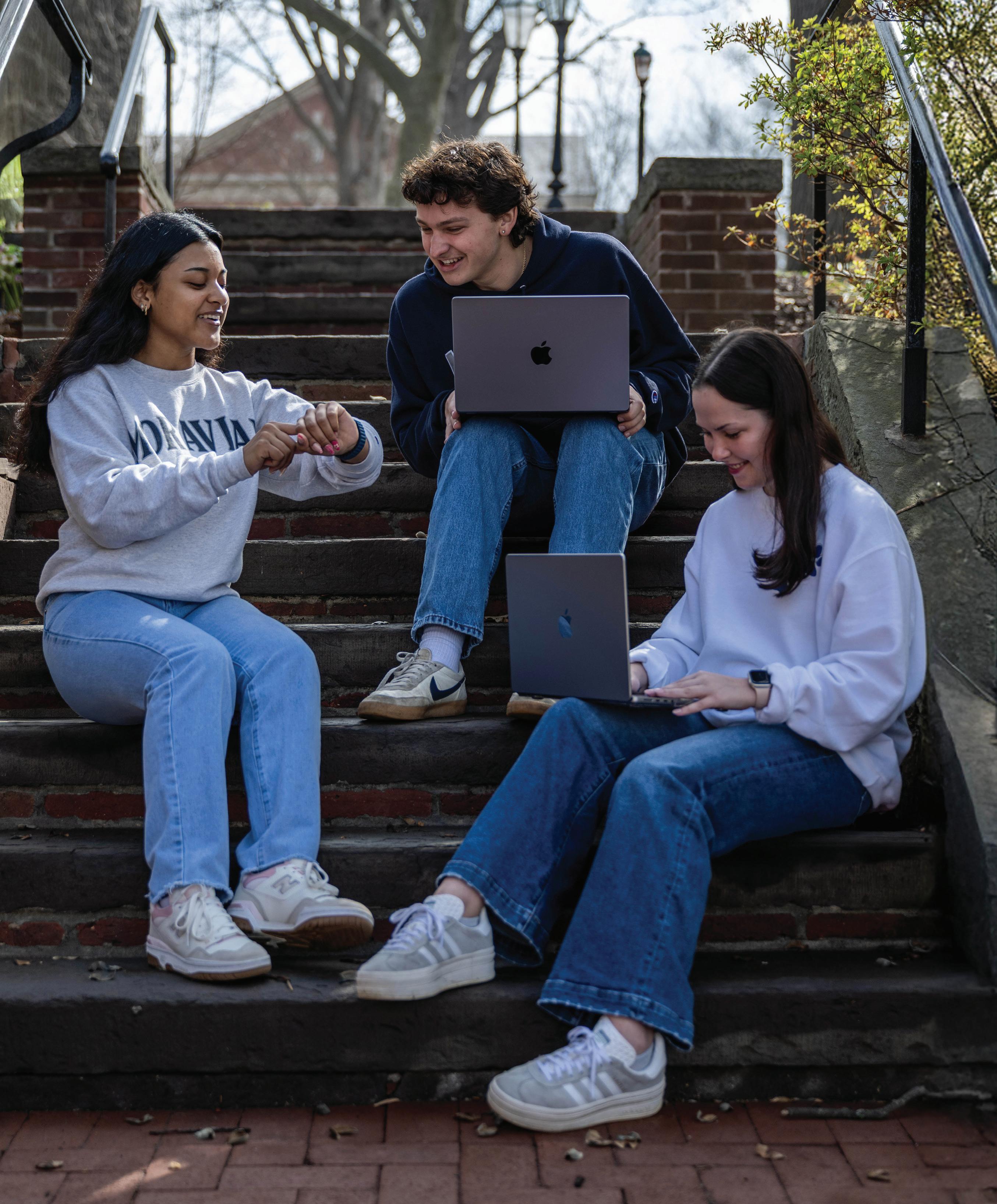
The best liberal arts education should offer a broad, interdisciplinary approach to learning that prepares students to reason, question, and lead in the diverse milieus of their personal and professional lives. Essentially, it should teach individuals how to be lifelong learners who can adapt and thrive in a rapidly changing world.
Moravian has embodied this philosophy for more than 280 years, faithfully moving its students toward deeper understanding, richer experiences, and more meaningful participation in life—while constantly evolving to meet the societal, political, and institutional challenges of each new century.
Elevate, Moravian’s distinctive undergraduate experience, was launched in 2021 and aims to position students to face the unique demands of the 21st century.
Coordinated through the Laurie Riley ’82 Center for Career Success, Elevate prepares students to stand out to potential employers or graduate schools and consists of three pillars: career development; academics that emphasize teamwork and leadership; and education abroad opportunities.
Director for Career Success Ryan Smolko says the overarching goal of Elevate is to create a holistic experience that develops students in an intentional way, while taking into account the different barriers to success that members of Moravian’s student body typically encounter.
“Moravian’s mission has been to democratize education,” Smolko says. “We have a very local population, with many first-gen college students who may not know a lot about different career paths or about connecting to their community, and may not have had the opportunity to travel at this point in their lives.”
Elements of the Elevate experience are available to first-year students, upperclassmen, and even transfer students.
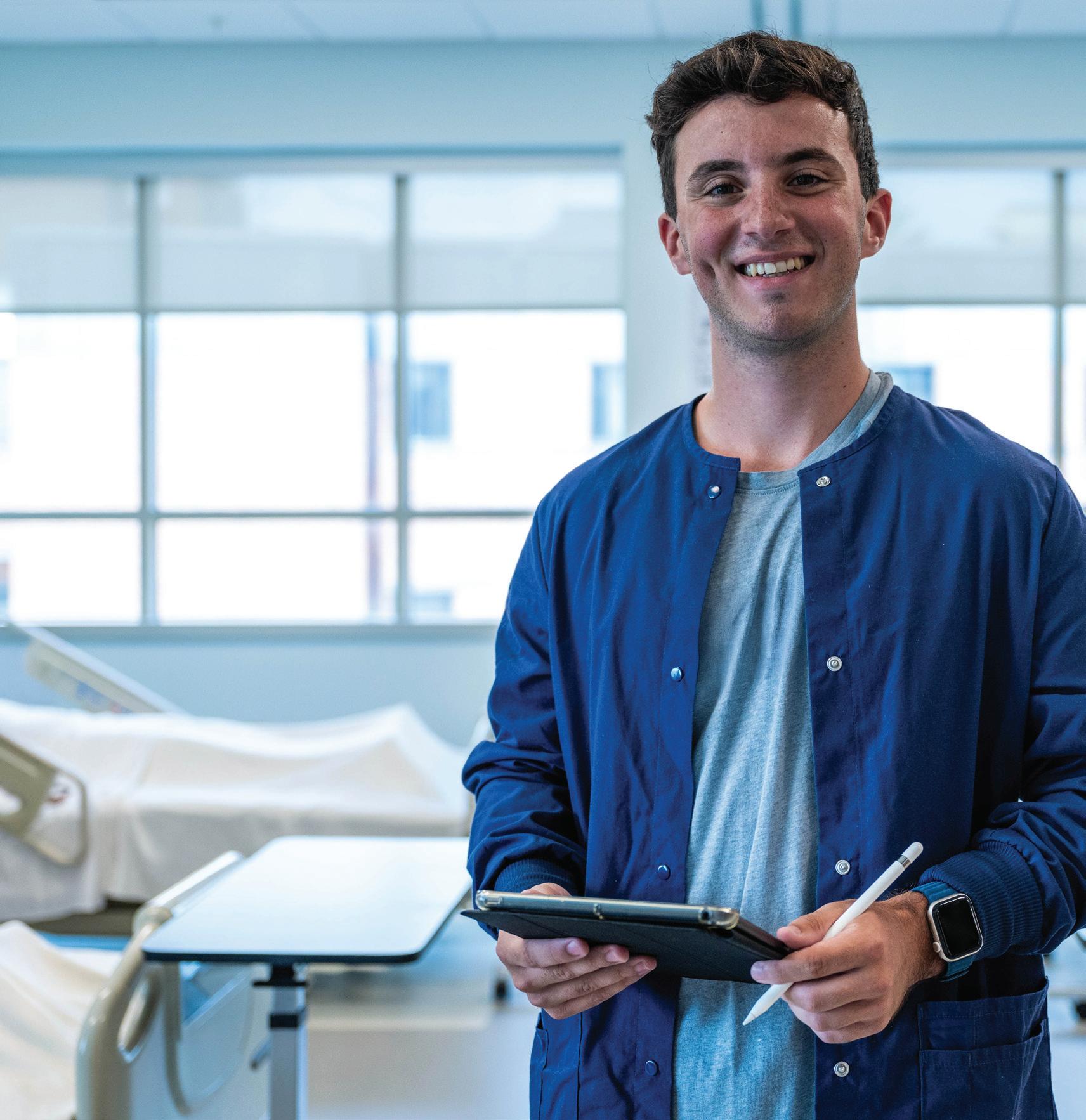


“Moravian’s mission has been to democratize education. We have a very local population, with many first-gen college students who may not know a lot about different career paths or about connecting to their community, and may not have had the opportunity to travel at this point in their lives.”
—Ryan Smolko
As part of Elevate, every undergraduate student has a designated career success team within the Laurie Riley ’82 Center for Career Success. Members of the team help students identify their strengths, interests, and values through various career assessments.
These coaches work one-on-one with students in choosing majors, developing résumés, selecting graduate schools, and preparing for interviews. Additionally, the advisors facilitate connections with alumni that can lead to internships, externships, and even postgraduation job opportunities. “Our office also puts on job and internship fairs every semester, proactively reaching out to local and regional employers, developing those connections,” Smolko says.
Elevate utilizes a digital badging program, essentially a cocurricular transcript of what students are doing outside of the classroom. Students can monitor their progress on the Suitable app to see what events and activities count toward what badges, and how they should plan their Elevate experience to meet the requirements.
“We’ve selected eight badges based on the skills and competencies that employers are seeking, according to the National
Association of Colleges and Employers,” Smolko says. “Students can highlight their completed badges on their résumés or in their portfolios and discuss them during job interviews.”
Completing all eight badges before graduation while meeting a 2.70 GPA expectation also makes students eligible for the Elevate Career Promise: If a student doesn’t have a job or is not in graduate school within one year of graduation, they will qualify for financial support to assist with paying student loans, Smolko says. Students in this situation also qualify for free enrollment in select undergraduate and graduate courses at Moravian.
The academic pillar of the Elevate experience is the RISE program (which stands for Reflection, Integrity and SkillBuilding to Elevate students). It includes two quarter-unit academic courses and a half-unit final course in which students work within their cohort teams in collaboration with one of Moravian’s community partners.
Both of the quarter-unit courses take students on a journey into teamwork and leadership in a liberal arts context while exploring their knowledge and insights through team experiences and actual leadership positions within the campus community.
While the RISE program involves coursework outside of one’s major, it is pass/no credit, so it has no impact on a student’s GPA. And as long as the program’s courses are taken within the permitted nine units per academic year, there are no additional tuition costs.
The director of the RISE program is Robert Brill, associate professor of psychology, who has a background in industrial organizational psychology and is an expert on leadership and teamwork.
“The first course includes a lot of selfassessment and reflection exercises that guide them as they engage with teamwork and leadership models and concepts introduced by faculty from a variety of disciplines,” Brill says.
“The second course is all about skill building, communication, decision-making, empathy, leadership, and emotional intelligence,” Brill adds.
The final part of the RISE program, what Brill refers to as a kind of “capstone team internship experience,” has students work as part of a team to collaborate with one of Moravian’s community partners to foster positive change in Bethlehem.
Last year’s RISE cohort completed six of these service projects, which Brill had set up for his students. At the end of the experience, a group of students in the next cohort who had attended the presentations asked Brill if they could choose their own projects. The students told Brill they wanted to do something for kids in highly disadvantaged local schools who have a tough time transitioning to college.
“This is the first one of the service projects that was grassroots from the second cohort, rather than top down from me,” Brill adds, “and I think the intrinsic motivation there is brilliant and beautiful.”
The final pillar of the Elevate experience introduces students to other ways of living and being in the world. In addition to having the opportunity to explore the Bethlehem community outside the confines of Moravian’s campus through RISE, students can experience people and places beyond the borders of the United States through the Global Greyhound Travel Program.
Anize Appel is both the executive director of the Center for Global Education and the dean for Education Abroad at Moravian.
“I know that to be successful in a career you have to be aware of cultural implications and realize that there’s more than one way to do something,” Appel says. “Making connections with people that you never would have come across in your life transforms you as an individual.”
After two semesters at Moravian, students are eligible to apply $2,600 toward the cost of one Moravian University Global Greyhound Short-Term Travel Program, which can take place during winter break, spring break, May term, or summer. Travel programs range in length from seven to 10 days and are led by Moravian faculty and staff.
The $2,600 fee is included in Moravian’s comprehensive tuition and fees, and encompasses airfare, ground transportation, accommodations, a minimum of two meals per day while abroad, and entry into all sites students will visit.
Since its inception, the Global Greyhound Travel Program has allowed students to visit such far-flung places as Austria, Costa Rica, Tanzania, and, most recently, France.
“We took 21 students to Paris this year, and out-of-pocket cost for them was $300,” Appel
“I know that to be successful in a career you have to be aware of cultural implications and realize that there’s more than one way to do something. Making connections with people that you never would have come across in your life transforms you as an individual.”
—Anize Appel

says.“The trip was, by design, an introduction to French culture, architecture, and food.”
The students visited such iconic places as the Eiffel Tower, the Opéra Bastille, and the Panthéon, as well as Fontainebleau and Versailles—which included guided tours and cultural lessons.
While there, the group was also able to experience public mass transportation, which many Moravian students, being from more suburban and rural areas, might not have had experience with before.
“We got them what’s called a Navigo travel card, which allowed them to visit all of the Île-de-France outside the city of Paris proper if they wanted to,” Appel says. “The first couple of days we’d have meetings in the mornings, and then we’d go out and do our planned activities, eat together, and then give them free time to lose themselves in the city of Paris.”
Appel notes that the parents of many of Moravian’s typical students are justifiably focused on making sure their children can secure a career and support themselves in the future, so international travel is not necessarily on the top of their lists of what makes a good college experience.
“I’m a child of immigrants, and I’ve seen the world through my parents’ lens and through my own travel,” Appel says. “I think many of the students that we serve have not had this opportunity, not for any other reason than it’s not accessible or easy for them to do so.”
While travel abroad is transformational for some students, it can provide clarity for others, especially those traveling abroad for the first time.
“There are always going to be some students who have the experience and decide,‘You know what, I’m good, I like it here in America,’ ” Appel says. “And that’s okay—but if they didn’t have that opportunity, can we say we have truly prepared them for their future?”

Students today are entering a world that is fast-paced, unpredictable, and deeply interconnected. Understanding global issues, embracing diversity, and acting as responsible global citizens have become increasingly important.
Additionally, skills like critical thinking, emotional intelligence, and technological literacy are no longer optional but necessary for success, so it’s crucial for students to develop habits of lifelong learning so they can continue growing long after graduation.
The first cohort of Moravian students to complete the Elevate experience will have a strong foundation in such a 21st-century liberal arts education.
“In the graduating class of 2025, we have 10 students who are considered to have completed Elevate, and they were recognized at our Academic Awards Ceremony this year,” Smolko says. “In the Class of 2026, we currently have about 35 students who are on track to complete it.”
Two of the students honored at the awards
ceremony this year for completing Elevate were dual marketing management and graphic and interactive design major Sara Turkdonmez ’25 and biology major Hailey Hoffman ’25.
“Being a first-generation student, I had no idea what I should do before I even started my journey at Moravian,” Turkdonmez says. “But the Elevate experience gave me a lot of options and helped me identify who I am as a person, and what I want to do.”
Like Turkdonmez, Hoffman is also a first-generation college student. “My parents didn’t go to college, and I don’t have any siblings who went to college, so I had nobody to ask any questions,” Hoffman says. “Doing my digital badges my freshman year provided me with a road map of things that I needed to be doing.
“And,” Hoffman adds,“one of the big rewards of the Elevate experience is that not only do you get the study abroad trip and you get the Career Promise at the end, but you’re building yourself to become a leader in the real world.”
Students who participate in Moravian’s distinctive undergraduate experience— Elevate—get a boost toward a career they love. Learn about five students who earned all eight badges during their time at Moravian.

By Elizabeth Shimer Bowers
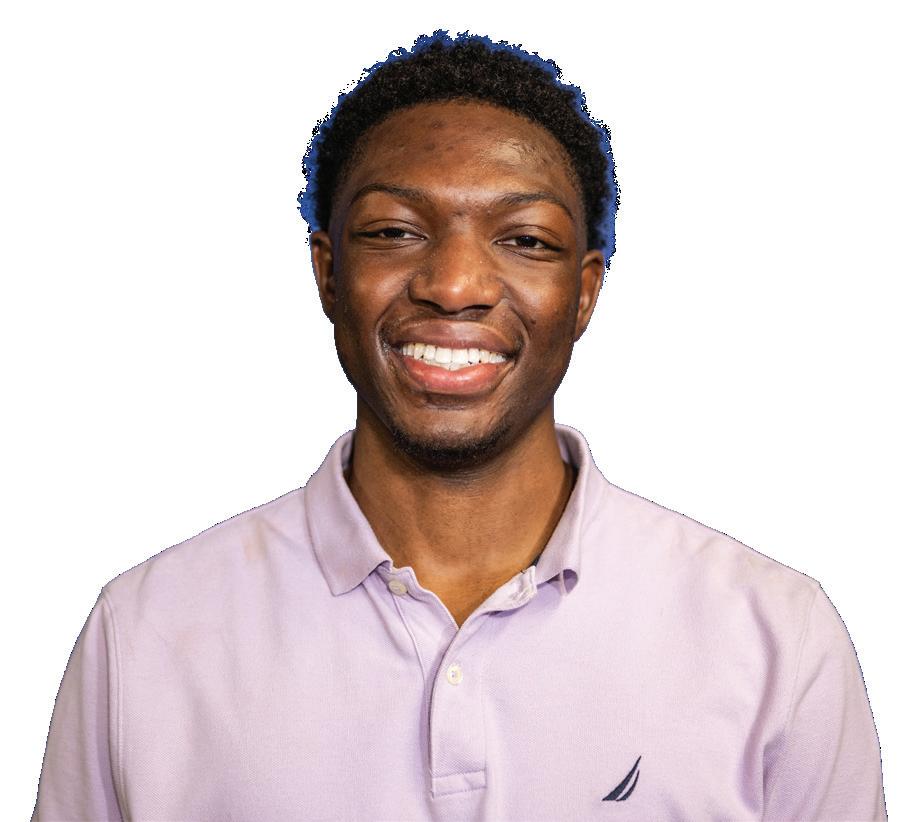

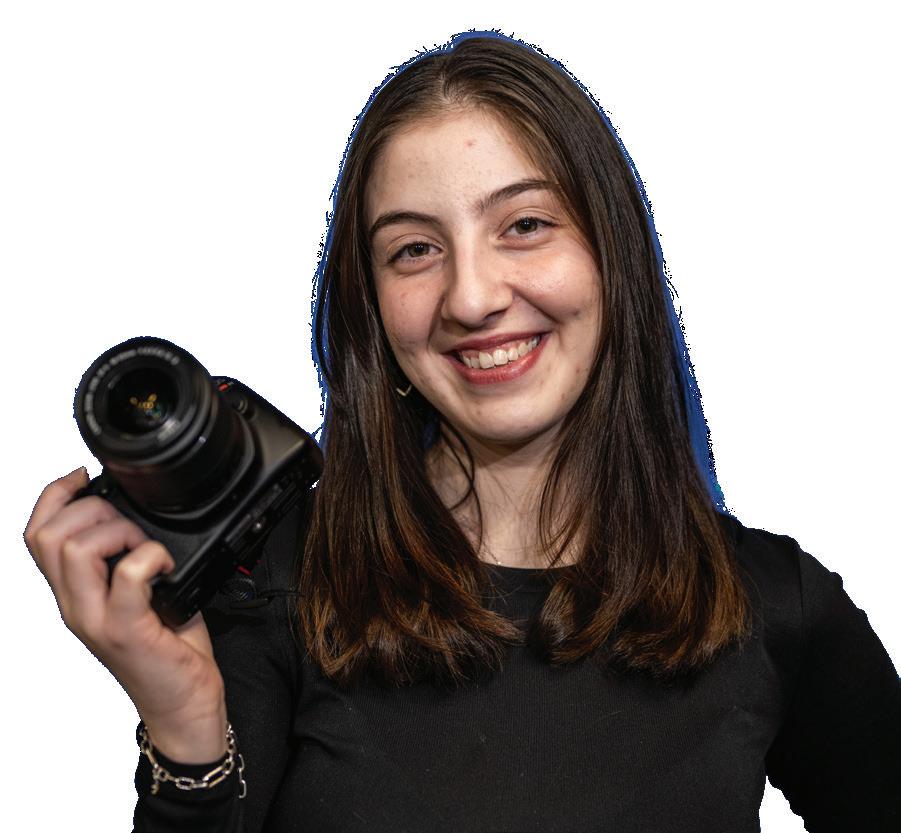
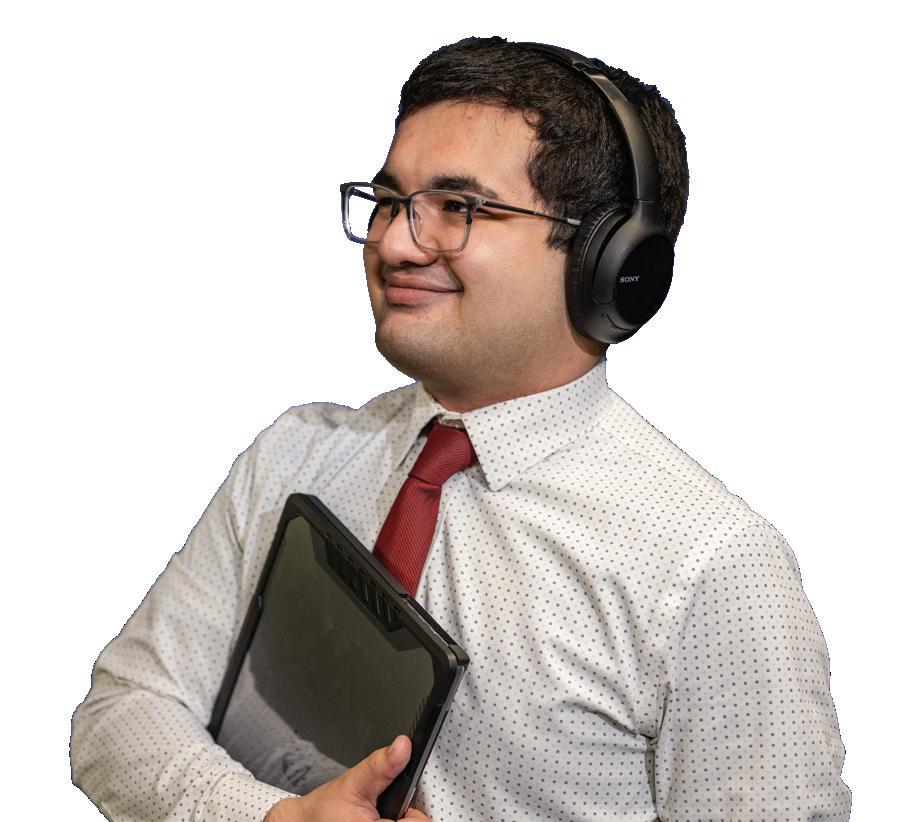
Moravian’s Elevate experience aims to uplift undergraduate students by equipping them with the tools they need to flourish both personally and professionally. From their first day on campus, Elevate connects students with a personal career success team and provides opportunities for leadership, global experiences, and hands-on learning.
As part of the process, students can complete eight Career Readiness Digital Badges: career and self-development, communication, leadership, critical thinking, equity and inclusion, professionalism, teamwork, and technology. Fulfilling the requirements for each badge
helps students improve their marketability and empowers them to stand out to potential employers and graduate schools.
This year marked the first class to graduate since Elevate began during the 2021–22 academic year. To date, 10 Moravian University students have earned all eight of their Career Readiness Digital Badges, giving them added skills and experience they will take with them into the real world. To earn the badges, students must accumulate a certain number of points—trackable through an app called Suitable— by attending certain events and activities on campus.
Students who complete the badges are eligible for the Elevate Career Promise. The promise acts like education insurance. Any student who has earned all eight badges before graduation and has met the 2.7 GPA minimum who is not employed or enrolled in graduate school within one year of graduating from Moravian qualifies for financial support to assist in paying their student loans, as well as free enrollment in select undergraduate or graduate courses and continued support from their career success team.
Meet five students who earned their badges and learn how they plan to turn their Moravian University educations into successful careers.
Hailey Hoffman ’25
A biology and environmental science major, Hailey Hoffman embraced the education abroad portion of the Elevate experience.
“I traveled to Tanzania and Costa Rica, and I am going to Europe this May. Because of Elevate, I was able to immerse myself in these cultures, explore diverse habitats, and become a more independent person,” she says.“I never would have been able to see these places had it not been for the travel stipend attached to Elevate.”
Hoffman says Elevate was a big factor in her decision to come to Moravian. “My admissions counselor told me about Elevate during my campus tour. What swayed me to ultimately choose Moravian was the Career Promise part of Elevate, which I never heard of from any other school,” she says.“While I am grateful that I will not need to use the Career Promise, it was always reassuring to know it would be there if I needed it. And the fully funded education abroad made me feel even better about my choice.”
Hoffman says Elevate indeed set her up for a productive four years on Moravian’s campus. “The badges helped me navigate campus involvement my first year and gave me high-
quality experiences,” she says. “As a first-generation college student, I found it hard at first to figure out what I was supposed to be doing with my time. Using the badge system on Suitable gave me a great guide to the opportunities that were available. And knowing my first year that I had to complete all eight badges, I joined different clubs and attended a variety of events. This gave me a foundation for leadership positions my sophomore year.”
As a result, Hoffman met the criteria for multiple honor societies and earned a coveted position as a conservation education intern with the Lehigh Valley Zoo.
Hoffman says the badges were not difficult to earn; she just needed to put in the effort to engage with the campus community, and she appreciated that the badge system kept her accountable. “I liked that there were points for every single event on campus, which always boosted the incentive to attend,” she says. “It also helped to have a log of events I attended, clubs I joined, and skills I learned all in one place so I could show a future employer and use it for my own reference.”
Academically, Hoffman says the Elevate experience gave her the opportunity to participate in a fully funded biology course that traveled to Costa Rica.“During the trip, I worked in the field and learned about the animals that live in Costa Rica. It gave me a sense of what it was like to work out in the field rather than learning in a traditional classroom setting.”
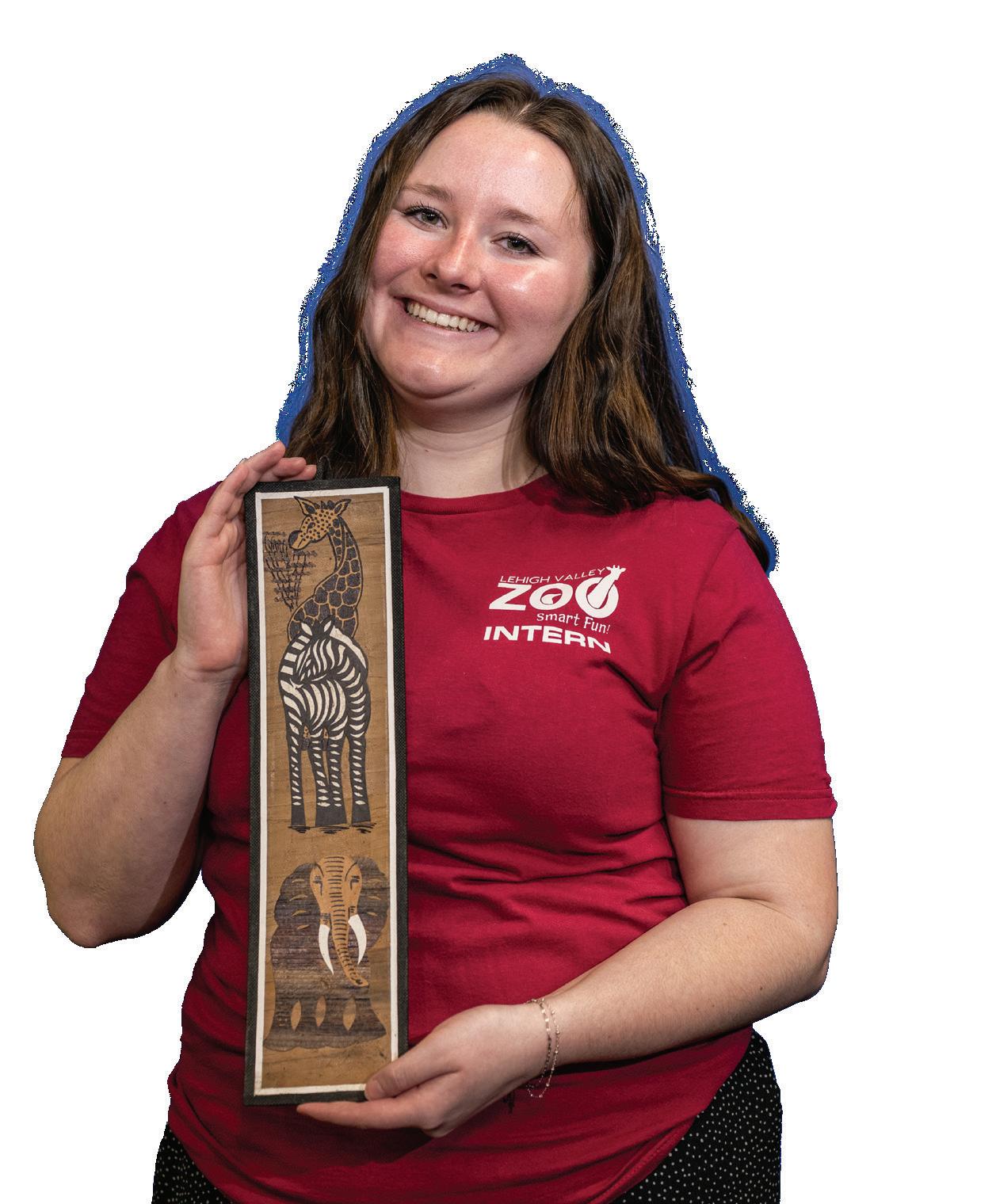
“Because of Elevate, I was able to immerse myself in these cultures, explore diverse habitats, and become a more independent person. I never would have been able to see these places had it not been for the travel stipend attached to Elevate.”
Out of the eight badges, Hoffman says the leadership badge taught her the most.
“I came to Moravian with few leadership roles, and I was surprised to see how much my leadership skills grew,” she says. She has served as the president of two organizations, treasurer of three, a course mentor, and a teachers’ assistant, and she has presented research at two national conferences.
“When I was a freshman, the leadership badge seemed scary, but as time progressed, leadership started to feel natural to me.”
Having graduated this past May, Hoffman plans to attend the University of Delaware for her PhD in animal and food sciences.
“The Elevate experience has prepared me for graduate school in several different ways,” she says. “My study abroad experiences have been great talking points in interviews with future employers and graduate schools. And having the log of tasks I completed on Suitable has given me the confidence that I do have skills in leadership, communication, technology, teamwork, professionalism, and equity and inclusion.”
Louis Spann ’26
As he looks back, Louis Spann says Suitable was the main driving force for his involvement and success during his first year and a half at Moravian University. A computer science major, Spann has a long list of extracurricular activities, including student trustee, audiovisual event technician, data analyst intern, Apple Pathways participant, president of Catholics on Campus, and member of the Amrhein Investment Club.
“I was intentionally not involved during my first semester at Moravian, so I could give myself time to discover and learn more about some of the different opportunities,” he says.“I used the Suitable app both as a benchmark for learning about different events and as a way to gamify getting out of my comfort zone.”
With Suitable as his accountability partner, Spann went to various campus events and became involved in student leadership. Once he finished with Suitable halfway through sophomore year, he felt he was in the right place and mindset to start thinking about his career and personal life.
“I already had experience job shadowing and going to job fairs at the end of my freshman year,” he says. “I meet with my career strategist on a regular basis now, and I have all the help I need as I get closer to my senior year.”
A natural leader, Spann says he got the most out of the leadership and teamwork badges.“Most of the other badges you can complete through going to campus events, but the leadership and teamwork badges were different because I had to work with my peers to accomplish self-led goals,” he says. “Apart from my classes, a huge part of my learning and some of my overall favorite moments at Moravian stemmed from being a student leader on campus.”
Spann was such a strong leader that he formed the Catholics on Campus club with the help of Carol Traupman-Carr, vice president for institutional effectiveness and dean for academic operations. Spann has since become president of the club. “Dr. Traupman-Carr has been my champion and instrumental in my success,” Spann says.
Although he is not completely sure what he wants to do when he graduates next year, Spann says he’s getting a clearer picture every day.
“As I built my résumé, networked, and practiced interviewing, I was building my professional skills and at the same time solidifying my values and goals. And many of those questions got answered as I went through the Elevate experience.”
“I know I want to work for a tech-driven company or an organization where technology plays a key role. I want to make something or provide a service that makes people’s lives easier,” he says. “As a rising senior, I am lucky to have another year left at Moravian, and I plan to make every second count, both for my professional journey and for the impact I have on fellow students.”

He adds that the Laurie Riley ’82 Center for Career Success at Moravian helped him shape his career goals. “As I built my résumé, networked, and practiced interviewing, I was building my professional skills and at the same time solidifying my values and goals. And many of those questions got answered as I went through the Elevate experience,” “It made me promote myself, advocate for myself, and give myself the sense of urgency I needed.”
Spann was excited to get firsthand experience in his field this summer by working as an IT data governance intern with Minerals Technologies.
Sara Turkdonmez ’25
Unsure of her major when she arrived at Moravian University four years ago, Sara Turkdonmez used the Elevate experience to explore possible career paths.
“During my freshman year, my career strategist helped me connect with a few alums in different fields, which helped me decide what I wanted to do long-term,” she says. “The Elevate experience helped me take a deeper dive into my career path.”
Her vision for the future quickly sharpened, and she became a dual marketing management and graphic and interactive design major.
“While all eight badges played an important role during my time at Moravian, some seemed more fitting for my areas of study,” Turkdonmez says. “For example, equity and inclusion, critical thinking, and communication are three badges that helped me in my marketing major, and the teamwork and technology badges helped me with graphic design.”
The career and self-development badge also supported Turkdonmez’s majors by giving her a firsthand look at what individuals in her field do every day. “Through internships and attending events with panelists who
helps empower students to fully realize their potential to transform the community and the world.
She says she learned the value of teamwork and leadership, both inside and outside school. Turkdonmez also got the opportunity to travel abroad and went to Japan this past May.
“And the teamwork badge helped me see the importance of working well together and how teamwork can make a huge difference in work and the community,” she says.
Another valuable life skill Turkdonmez took from the Elevate experience is critical thinking.“The critical thinking badge showed me the importance of thinking outside the box.‘How can I help others? What positive impact can I make? If I take this action, what will happen?’ were three of many introspective questions the badge taught me to ask.” Through her pursuit of the critical thinking badge, Turkdonmez gained opportunities to join organizations on campus such as Tri-Alpha National Honor Society for First-Generation College Students and Omicron Delta Kappa National Leadership Honor Society, as well as invitations to join executive boards of several organizations at Moravian.
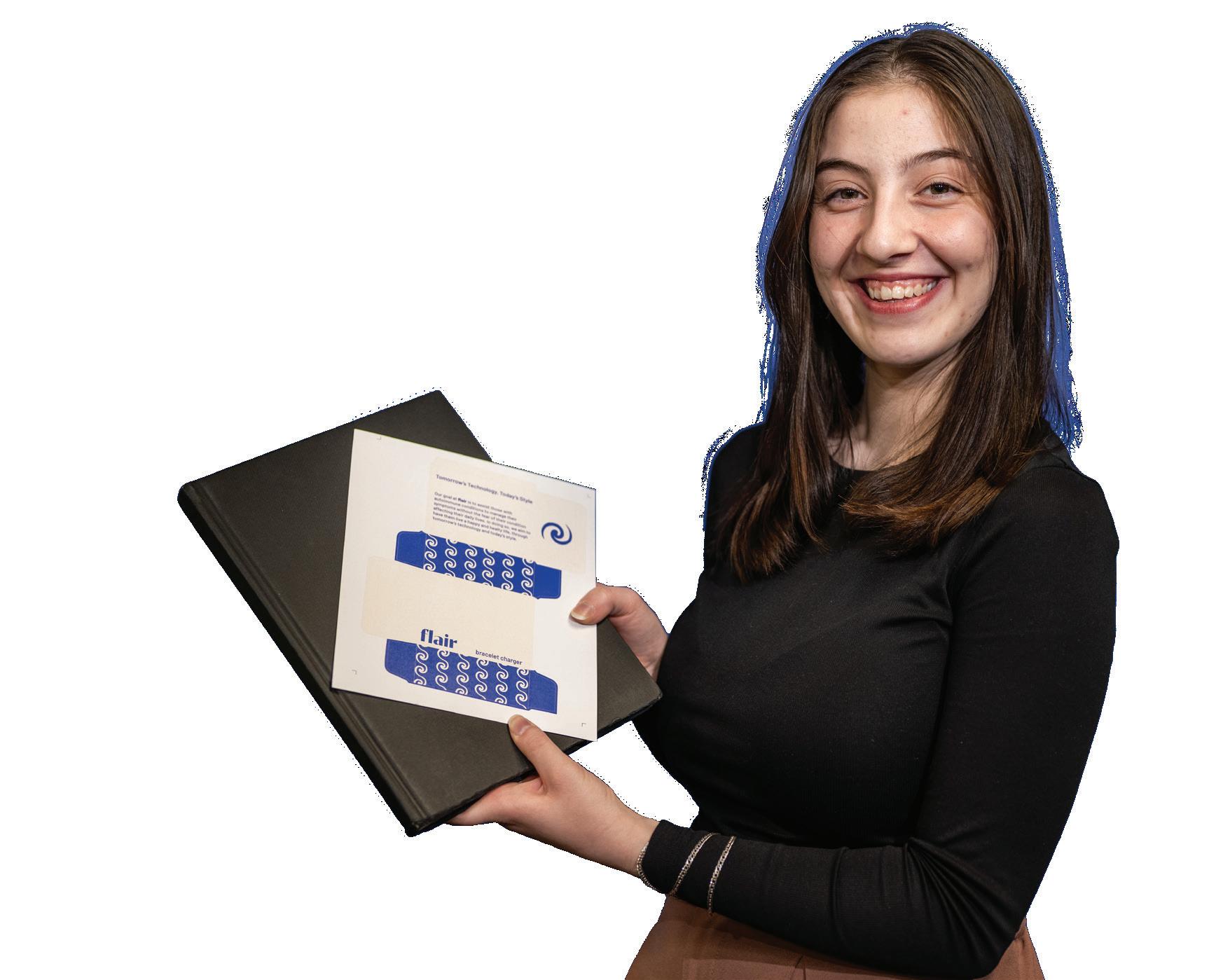
“The critical thinking badge showed me the importance of thinking outside the box. ‘How can I help others? What positive impact can I make? If I take this action, what will happen?’ were three of many introspective questions the badge taught me to ask.”
“From academics and honor societies to clubs and organizations, as I earned the critical thinking badge, I was able to appreciate how critical thinking plays a role in just about everything we do—it truly helped me grow as a person,” she says.
As Turkdonmez reflects on the Elevate experience, several specific events come to mind. “One of my favorite events was a panel held in the Payne Gallery titled ‘From the Lehigh Valley to the Fashion World’ where four Moravian alumni shared their experiences in graphic design and offered advice to students pursuing graphic design and planning to work in the fashion industry,” she says.
Turkdonmez also enjoyed working as a writing fellow, assisting first-year students. “I was happy to help students express themselves through writing,” she says.
Turkdonmez worked as a medical product marketing intern at Olympus in Center Valley earlier this year, attended a Moravian-led trip to Japan this past spring, and graduated in May.
“Postgraduation, I am open to trying new things and seeing where my education and experience take me,” she says.
“I remember looking at all the campus involvement options and seeing sorority rush. So, I decided to put myself out there and am so happy I did, because my sorority has been a key part of my college experience.”
Preparing for her teaching career, Anastacia Faisetty knows she will use the competencies she gained as part of the Elevate experience to become a productive member of society. “I am grateful for Elevate—it opened my eyes to all the opportunities on campus,” she says.
A native of Bethlehem and a graduate of Freedom High School, Faisetty says she cried when she learned she’d been accepted to Moravian. Soon after starting as a freshman, she discovered the Elevate experience and became more involved with the Career Center.
Faisetty embarked on her academic career in the school of nursing because she wanted to help people. Now a secondary education major with an English track, she is ready to start her teaching career and help people in a different way.
Similarly to other Elevate graduates, Faisetty cites the accountability factor as integral to her success. Without Elevate, Faisetty says she would not have fully immersed herself in all that Moravian has to offer. “I know I wouldn’t have considered attending many of the events if I hadn’t been working on the badges,” she says.

For one, she landed in her sorority, Alpha Sigma Alpha.“I remember looking at all the campus involvement options and seeing sorority rush,” Faisetty says. “So, I decided to put myself out there and am so happy I did, because my sorority has been a key part of my college experience.” As part of ASA, she has served as the sorority’s education and finance director. She also expanded her role in the Laurie Riley ’82 Center for Career Success by serving as a Career Development Strategist Student Ambassador.
Faisetty has always been interested in technology, so earning the technology badge was second nature to her. “I knew Moravian supplied you with Apple technology before I came here, which was a big deciding factor for me,” she says. “I completed all of my work with Apple technology, and the badging process helped me get out of my comfort zone and grow professionally.”
She adds that she would not be where she is career-wise without Elevate. “The Elevate experience has opened my eyes to the experiences that helped me expand my résumé and prepared me for my future.”
Now that she’s graduated, Faisetty plans to finish her student teaching and start her career as an educator in the Lehigh Valley. “I grew up in the valley and have gotten everything I currently have here. It is finally my turn to start giving back in a way I know will be impactful, and that is teaching.”
“I had to push out of my comfort zone to complete those badges, especially for leadership. I actually had to take on leadership roles and interact as a leader on campus to finally complete the badge.”
A dual major in computer science and finance, Mael Tshiyonga completed all eight Elevate badges by the end of his sophomore year—an impressive accomplishment that gives him a significant jump start on his academic and future career.
“The Elevate experience has been so valuable because it allowed me to learn what employers are looking for from students coming out of college. As I strived toward the eight badges, I worked to improve these skills,” he says.
Tshiyonga admits his experience with Elevate was different from what he expected. “I was happy that I was able to complete several of the badges by keeping up with good grades and becoming involved on campus,” he says. “Joining a lot of activities during my first year helped me complete the badges at a faster pace.” Some were clubs he had no idea about, such as the English as a Second Language Club. “There are many things I would not have done without Elevate.”
Another pleasant surprise Tshiyonga encountered on his journey toward the badges was participating in Ubuntu, a student mentorship program for first-year students from underrepresented communities that takes place the weekend before orientation. “It was a fun weekend where I made good friends before orientation, which helped the transition into college,” he says.
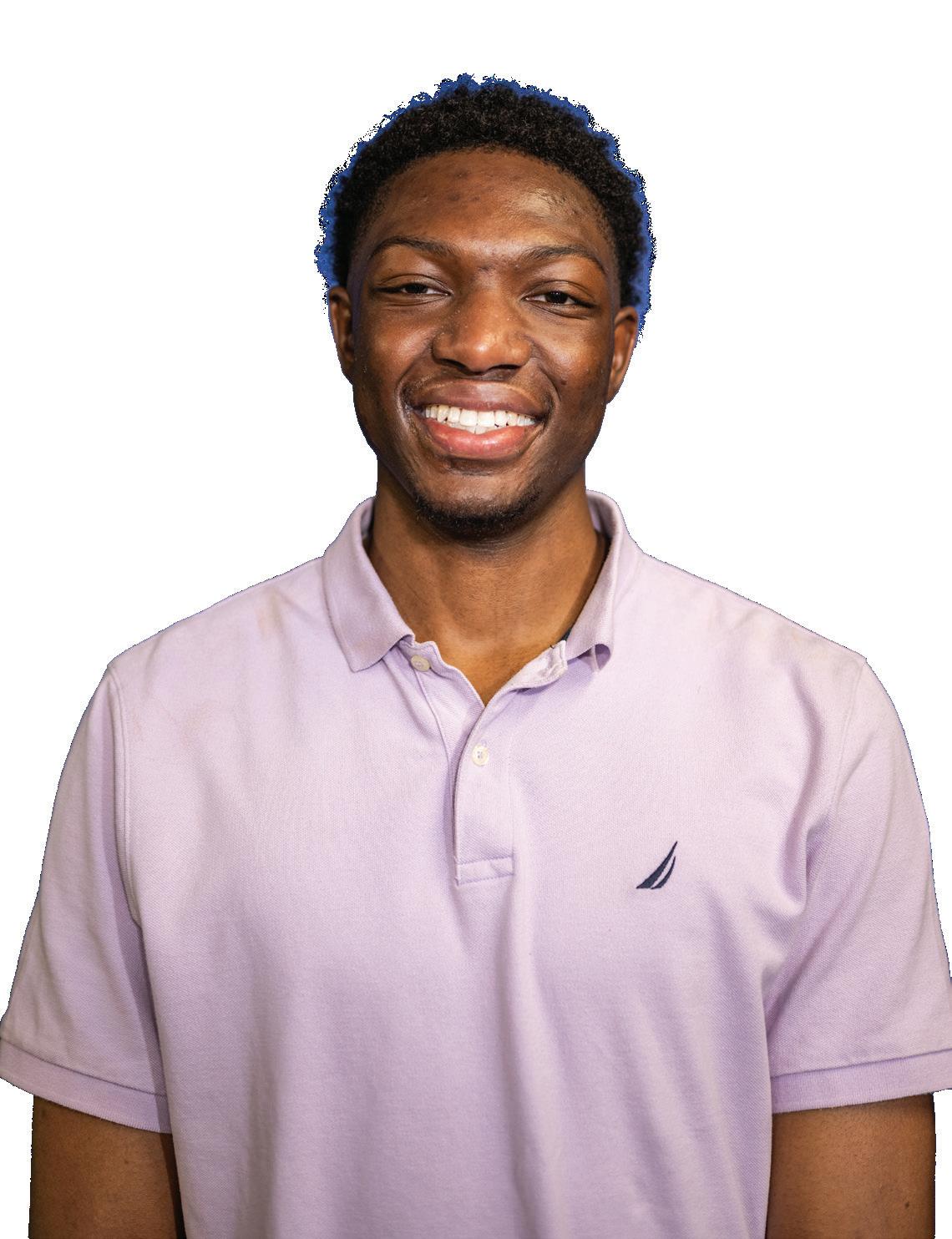
Tshiyonga says the two badges that taught him the most for career preparation were leadership and professionalism. “I had to push out of my comfort zone to complete those badges, especially for leadership,” he says. “I actually had to take on leadership roles and interact as a leader on campus to finally complete the badge.” The roles he has filled include Career Development Strategist Student Ambassador with the Laurie Riley ’82 Center for Career Success, member of the Black Student Union Club and Men of Color Alliance, and track and field athlete.
With respect to his major, Tshiyonga says the technologies and topics covered in his computer science classes translated beautifully to Elevate and the related badges. The experience also helped push him to keep high grades, make the Dean’s Honor List, and sustain high academic achievements thus far.
As an incoming junior, Tshiyonga is not exactly sure what he wants to do after graduation in 2027, but he knows he would like to get a job in his field. “The skills I’ve gained through the Elevate experience have taught me communication, leadership, and teamwork,” he says, “and I understand what employers are looking for and what I need to work on in my years at Moravian to stand out.”
Moravian’s Career Readiness
Digital Badging Program has been nationally recognized as a model for scalable, student-centered career development. It was recently featured in a case study by Suitable, which highlights Moravian’s approach to helping students build confidence, gain clarity, and engage early in their career journeys.
Learn more: https://www.suitable .co/knowledge-center/case-studies
For decades, Patricia Nemesh Schoenen ’70 and her husband, Robert J. Schoenen Jr., have been champions of Moravian University and the greater Lehigh Valley. Through tireless volunteer work and philanthropic support, they have built a legacy rooted in service, connection, and community impact.

For Patricia Nemesh Schoenen ’70, her journey of service began humbly— with a teapot. As a young alumna, she volunteered to pour tea at a reunion event for Moravian graduates. “As a 21-year-old, my first reaction was ‘Oh my gosh, they graduated 50 years ago,’” Pat recalls.“Well, I’m out 55 years this year, and I’m thinking the students are probably saying the same thing about me!”
That small gesture launched a decadeslong commitment to Moravian and to service across the Lehigh Valley. Pat and her husband, Robert J. Schoenen Jr., have since become a beloved constant at Moravian events—cheering on athletic teams, attending giving society gatherings, and even chairing the inauguration of Moravian’s 14th president, Ervin Rokke. Bob was awarded an honorary degree from Moravian in 1998 and served as vice president for advancement in the early 2000s, deepening the Schoenens’ connection to the university.
At the heart of their contributions is a simple motivation: “I want to make a difference,” says Pat.“I want to make something better.”
As a Lehigh Valley native, Pat was already familiar with Moravian when she stepped on campus as a mathematics major in 1966.
She was drawn to the university’s close-knit community and personal approach to education. “You get to know all the students; you get to know your professors. It’s a whole different ball game than the larger schools,” she says.
She quickly became involved on campus, tutoring children at Bethlehem’s Donegan Elementary School and serving on Moravian’s birthday committee, delivering cakes and serenading students on their special days.
During the summers, Pat worked at Schoenen’s Supermarket, a Bethlehem landmark owned by Bob’s family. She worked alongside his father in the meat department and his grandfather in produce. “I tell Bob he married the help,” she laughs.
The couple married while Pat was still a senior at Moravian and have been together ever since. “To this day, I feel like Moravian should have been my alma mater,” Bob says.
Their bond with the university deepened through a close friendship with Herman E. Collier Jr. P’86, Moravian’s first lay president, and his wife, Jerline Collier P’86. Jerry was the one who invited Pat to pour tea for alumni and later recruited her to volunteer for Moravian’s Antiques Show. That year, Pat helped enlist volunteers, then continued serving for another 25 years.
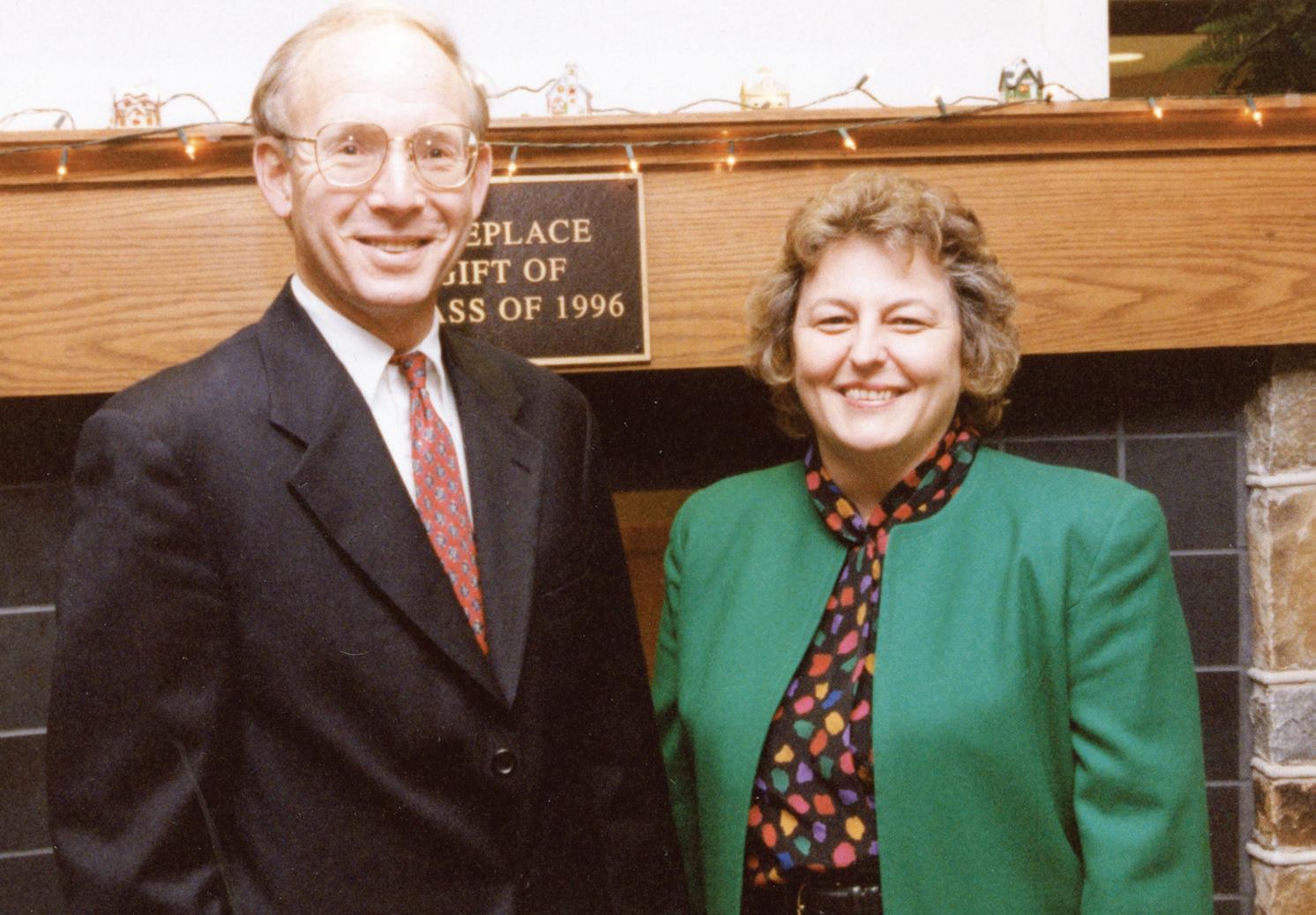
She also became treasurer of the Alumni Association’s Board of Directors—her first board experience and a natural fit for a math major. “Numbers and doing all kinds of financial things were right up my alley,” Pat reflects.
Pat’s passion for helping others soon extended well beyond Moravian’s campus. She began as treasurer for the St. Luke’s University Health Network Charity Ball, starting a record of service that spanned more than four decades and nearly 10,000 volunteer hours. She later joined the hospital’s auxiliary board, first serving as treasurer and vice president before her fellow members encouraged her to serve as president. At first, Pat demurred, saying she felt most comfortable with the account books, but looking back, she’s glad she changed her mind. “Of course I became president, and I don’t think I’ve been treasurer of anything since,” she says with a laugh.
“She’s very good at setting priorities and taking in the big picture of where an organization is, what their goals are, and developing the leadership skills to lead the organization in that direction,” says Bob.
One of her proudest achievements is leading the unification of Northampton and Lehigh Counties’ Meals on Wheels programs. Pat helped the separate programs overcome long-standing financial and structural differences by focusing on shared purpose and potential.“What was key to convincing everyone was that we could expand the area we delivered to,” recalls Pat.
As the founding president of the new Meals on Wheels of the Greater Lehigh Valley, Pat helped extend the organization’s coverage area to reach more people in need. Bob delivers meals throughout the Bethlehem area and sees the impact of Pat’s leadership reflected in the gratitude of the people he serves. “It’s part of being a member of a community where you give back to those who are in need,” he says. “That’s what Moravian taught me.”
“ I love the students today and am just impressed with them, their majors, and their involvement. Students today are better educated and more worldly and can interact with adults much better than we could 50 years ago.”
—Patricia Nemesh Schoenen ’70
After 21 years of service to Meals on Wheels, including four years as president, Pat stepped away briefly, only to return in 2024 with renewed energy for the organization’s mission. Today, she’s thrilled to serve alongside fellow Moravian alumni, including CEO Erik McGaughey ’91 and three other board members.“There is such a Moravian connection now,” she says. “To see all these people who are Moravian grads doing this nonprofit work impresses me.”
The Schoenens remain deeply involved with Moravian’s students and campus life. As longtime members of the Blue & Grey Club, the couple are loyal supporters of varsity athletics and dedicated fans of women’s basketball and softball, even joining the teams on the road. Pat also coached the women’s golf team in the 1990s, earning Moravian’s Harvey Gillespie Outstanding Coaches Award in 1999. She has served on the Golf Classic Planning Committee since 2022 and co-chaired the 2025 committee.

The Schoenens’ philanthropy continues to shape Moravian’s future. Pat is a founding member of the Anna Nitschmann Society, which recognizes and uplifts Moravian’s women leaders and philanthropists. She formed a close bond with the society’s inaugural scholarship recipient, Catherine Lovett ’25
“Since I met Pat, she has been a shining light, helping me through my time at Moravian University,” says Lovett. “Pat not only listens but goes above and beyond and is always present. She attended my nursing pinning ceremony this past May and celebrated with me when I accepted my job at St. Luke’s. Pat is a proud supporter and takes pride in education, empowerment, and community.”
Pat feels the same sense of admiration. “I love the students today and am just impressed with them, their majors, and their involvement. Students today are better educated and more worldly and can interact with adults much better than we could 50 years ago.”
In 2024, Pat was honored with one of Moravian’s highest accolades: the Medallion of Merit. This prestigious award, presented annually to an alum who exemplifies
exceptional service and dedication to the university, recognized Pat’s decades-long commitment to Moravian.
Recently, the Schoenens made a transformational gift to establish The Patricia Nemesh ’70 & Robert J. Schoenen Jr. Conference & Events Management Reception Area in the expanded Haupert Union Building. The new space will host a wide range of student, faculty, and community events, helping foster collaboration and meaningful connections and welcoming the Bethlehem community to campus.
President Bryon L. Grigsby ’90, P’22, P’26, P’29 recognizes the profound impact the Schoenens have had on Moravian. “Through their years of volunteering, generous support, and unwavering dedication, Pat and Bob have strengthened not only our university but also the lives of countless students,” he says. “Their commitment reminds us that true leadership means giving back to the communities that shape our future.”
“We feel that we are doing some good by helping Moravian,” says Bob, “but most importantly, Moravian is taking from us
Shining Lights, the Moravian University Alumni & Community Awards, was held on April 11, 2025. Sponsored by the Alumni Association, this annual event honors Moravian’s outstanding alumni and community partners for their accomplishments, as well as students for their dedication to the campus community.
Alumni Awards
• Jon P. Otis ’79— Comenius Alumni Award
• Justin P. Driscoll ’05 and Jennifer Kunes Driscoll ’05, G’11— Haupert Humanitarian Award
• John C. Mikovits, PhD, RN ’08, G’15— Benigna Education Award
• Jonathan L. Strauss ’16— Young Alumni Achievement Award
Shining Star Community Partnership Awards
• Taina Estremera, MS, ACC— Serene Consulting
• Historic Hotel Bethlehem
Alumni Fellows
Kayla J. Biege ’25
Cielo A. Disla ’25
For more information, visit moravian.edu/shininglights.
and making students into much better individuals to serve whatever community they settle in. Moravian looks to the future.”
Pat agrees.“Over the past 55 years, Moravian has done a good job in helping make the future a better place.”
Together, Pat and Bob Schoenen exemplify the spirit of service. Their legacy is more than their time and resources—it’s the inspiration they give others to make a difference and build community, lighting the way for future generations. —Kristen Ziegler
Co-Chairs,

What is your personal motto?
Mike: “It’s a wonderful world.”
Kathleen: “Always go out of your way to help others.”
How do you spend your free time?
Reading, golf, serving on community boards, singing, going to shows.
What would people be surprised to learn about you?
Mike: In 2023, I was recognized as one of the top 10 Dale Carnegie trainers in North and South America.
Kathleen: I am a doubles tennis champion at Northampton Country Club.
Who is your favorite musician/band/performer and why?
Bette Midler—she is daring, touches the heart, and speaks truth.
Who at Moravian most influenced you and how?
Dick Schantz. He created in us a passion for music and an appreciation for excellence in performance.
Share your favorite memory from Moravian.
Mike: Attending my first Christmas Vespers and seeing the candles flow into the sanctuary. For me, it was transforming.
Kathleen: It was crossing Checkpoint Charlie in 1968 as the choir crossed into East Berlin. We were struck with the contrast of the freedom we enjoy and the control under which the East Germans lived.
What was your favorite meal in the dining hall?
Mike: As a resident, I enjoyed the Sunday lunches. The food always seemed to taste better.
Kathleen: As a commuter student, my favorite was peanut butter crackers and Coke.
What advice would you give to a current student?
Appreciate the unique community that exists at Moravian and the personal attention of the wonderful faculty. Take the
opportunity for internships and mentorships and engage in the diversity of campus groups.
Why is it important for you to serve/volunteer?
The impact of our experiences at Moravian is integral to who we are today. Through our volunteer service, we hope to provide the same transformation for current and future Greyhounds. Our class, the Class of 1968, maintains strong, loving, and supportive connections to Moravian and each other. When we speak to friends who are graduates of other colleges, they are amazed at the connection we enjoy. When we met President Grigsby at the Senior Open at Northampton Country Club, our friends could not believe that the president knew us and was happy to see us. The Moravian Greyhound connection is strong.
How do you believe Lighting the Way will help our students, their future, and the next generation?
For 283 years, Moravian has been at the forefront of higher education, preparing young men and women for creative, productive, and fulfilling lives. The core values of Moravian will also continue to provide the moral compass we need to guide our society. Lighting the Way will enable our alma mater to engage the finest faculty minds and leading-edge technology resources needed for success in today’s world.
What are you most excited to see Lighting the Way make possible for Moravian?
Lighting the Way will indeed light the way for the young men and women who will lead and guide our society for the next 50 years. Our campaign is empowering our students to explore internships, career opportunities, new fields of study, community service, and international travel—all of which are enriched by the crucible of Moravian’s historic values.
To learn about all our community members leading us in the Lighting the Way campaign, visit moravian.edu/lightingtheway/leadership
When it comes to new experiences, Rebecca Francis ’90 says she has found personal and professional growth by asking herself, “Why not?”

When examining her life’s path, Rebecca Francis ’90, who majored in graphic and advertising design with minors in English and psychology, laughingly says, “Honestly, my whole journey is a ‘Why not?’ It may have started when one of my English professors asked if I would tutor other students. I was unsure, but then I thought, Why not?”
As a speaker at Moravian’s 2025 Founders Forum, Francis led a breakout session titled “Tell Me Why Not?,” which explored the impact of shifting your perspective from “why?” to “why not?” She believes applying this to both her personal and professional growth helped her navigate the challenges life presents. “I’m totally a ‘glass half full’ kind of person. I’m always thinking, Let’s try this. If it doesn’t work out, it will take me in a new direction.”
Francis calls herself a lifelong learner, an idea her parents embraced and one she holds very dear. But it didn’t quite make sense until she arrived at Moravian. “Exposure to the liberal arts program was incredible. All I wanted was design; it felt comfortable. But I took classes in religion, science, math, psychology—and all of a sudden I started to have other interests. I realized there are so many things I can relate to! These skills seemed like add-ons at the time, but they’ve been the foundation of my success.”
She also thoroughly enjoyed her art classes. “I loved the courses and the head of the department, Rudy Ackerman. He was an amazing man and ran such a great program. At that time, it was literally the beginning of using computers for design; we were so cutting edge on these little Apples!”
Want to learn more about what Moravian University alumni are up to? Check out moravian.edu/ classnotes.

Following graduation, Francis worked in design, first in Philadelphia, then moved with that firm to Miami. After a layoff, she built a growing portfolio of clients, eventually opening her own successful design agency and running it for 10 years. Clients included universities and food manufacturers, along with corporations such as Sony and Olympus. While working full-time, she also attended an evening program full-time to earn her MBA in marketing and international business from the University of Miami. “I keep myself open to new opportunities and experiences, and as a designer, an MBA was kind of a stretch. I pursued international business partly because Miami was very diverse and multicultural. For the first time, I was in the minority, which was a life-changing thing I loved.”
When her husband was offered a job overseas, they moved to Surrey, England, with their 9-month-old daughter, then later to Tokyo when their second daughter was just 9 weeks old, and finally to Hong Kong. Again, Francis was in the minority but embraced that throughout their travels. While overseas, she put her career on a soft hold, revisiting her options once she and her family returned to the United States.
“After exploring the business of flipping houses, I realized I needed to learn more and obtained my real estate license in 2015. My first sale was a $2.2 million home, and that success led to me creating my own team, The Rebecca Francis Team at Berkshire Hathaway, Fox & Roach, Realtors. We’re at the top of our game; we have the most buyers and sellers of high-end homes ($700,000 plus) in the valley.”
Francis’s broad array of skills and her diverse background—combining a designer’s eye with persuasive writing and effective marketing—has contributed to her team’s success.“I love what I do,” she says. “My business is so interesting, and every day it’s different, with so many facets to it.”
In addition to running her agency, Francis is dedicated to her family—“Anything to do with my kids I love!” She is an avid reader and works out daily, at the gym or by walking or playing golf or pickleball.
Despite her robust schedule, she has found that “the biggest changes in life, the biggest opportunities, come when you take a leap of faith. The most exciting moments happen when we have no idea where it’s going to take us.” —Renée A. James ’80
A job coach for young adults with special needs at the Mercy School in Allentown, Mike Hosfeld ’82 finds joy in watching students grow their confidence, both academically and as they prepare to go out into the world.
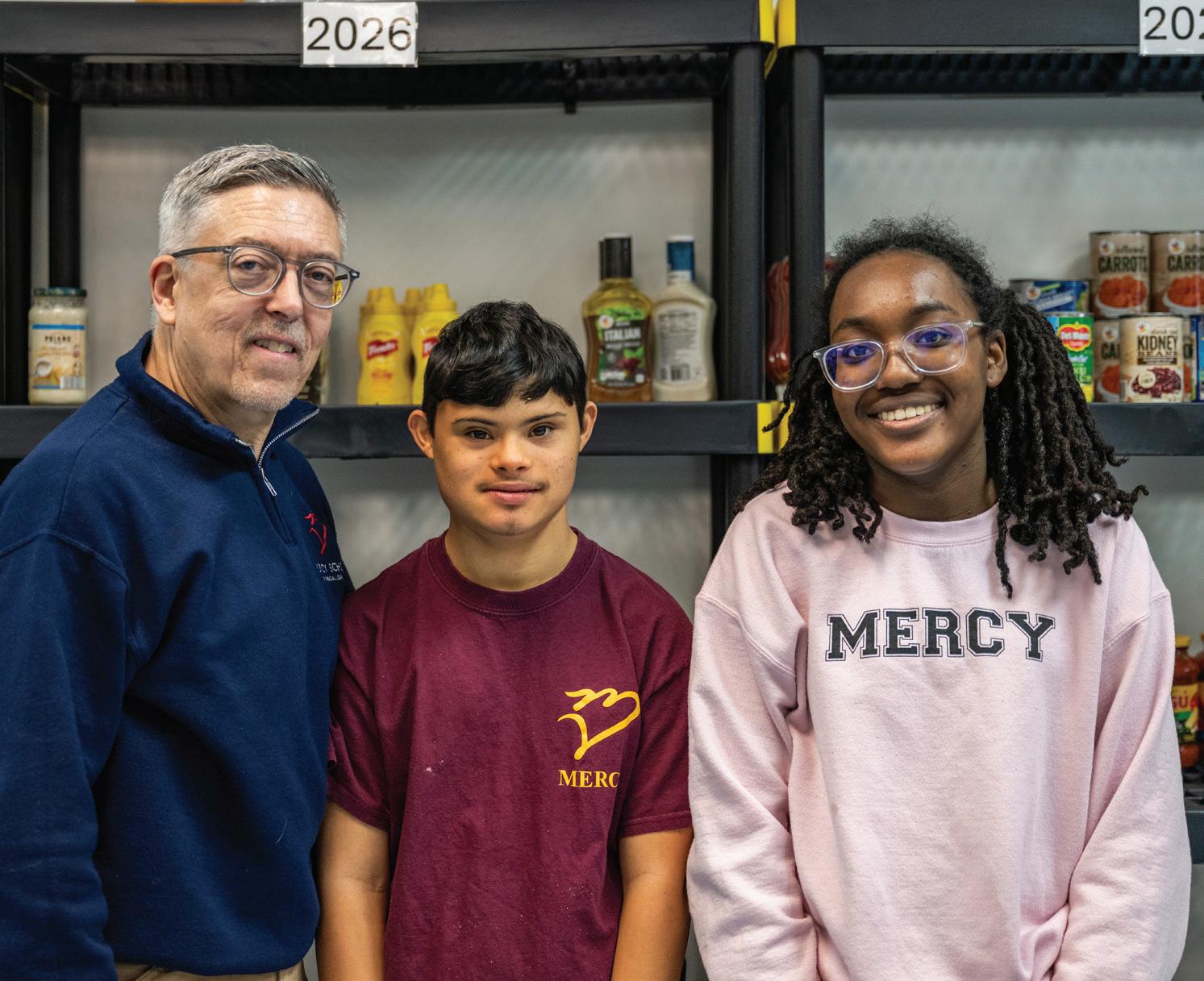
“I always tell everyone Disney has nothing on us,” says Mike Hosfeld ’82.“Here is where the magic happens.”
Hosfeld is describing the energetic atmosphere of the Mercy School for Special Learning, the Lehigh Valley’s only private, nonresidential school for children and young adults with special needs. Here, colorful pictures and art plaster the walls, students wave and smile as you walk the halls, and a dedicated staff works tirelessly to create a welcoming environment for all kinds of learning.
Hosfeld is a job coach for young adults at the Mercy School. In this role, he works directly with students to help them develop
a wide variety of skills, try out different professional environments, and ultimately take steps toward independence and potential employment.
But Hosfeld didn’t always expect his path to lead him to this kind of work. After acquiring his business management degree, with concentrations in accounting and German, he spent 35 years climbing the ranks at a global business information company. After a series of layoffs left him suddenly without a job in 2020, he began reflecting on his lifelong work as a volunteer.
“Through this work, I had discovered I had a gift for working with students with special needs,” Hosfeld says. “I didn’t care if it was
for pay or as a volunteer—I knew I wanted to keep working with them.”
A chance connection, coupled with auspicious timing and Hosfeld’s fresh vision for his future, led to an opportunity. Hosfeld’s physical therapist learned about his passion and connected him with the Mercy School, which had a job opening. The rest is history. Since 2021, Hosfeld has worked to support students in reaching their utmost potential. His background in business, gained through his Moravian education and his extensive experience in corporate America, has helped him foster partnerships with businesses and organizations throughout the Bethlehem and Allentown area.
One of these fruitful relationships is with Moravian University, where Dean for Career Success Kristin Eicholtz is a longtime collaborator of Hosfeld’s. Together, they have organized Mercy School events such as professional development workshops and service projects spearheaded by Moravian students. Each week, Mercy School students head to Moravian’s campus to work in the Laurie Riley ’82 Center for Career Success.
“It really is not only special for the students that Mike is bringing here, to see the smiles on their faces, but the smiles also on the Moravian students’ faces,” Eicholtz says. “I look forward to the days they come.”
This past February, Moravian’s partnership with the Mercy School culminated in a successful nutrition workshop organized by Moravian’s Associate Professor of Public Health and Director of the Public Health Program Colleen Payton and students in her public health internship program.


In small groups, Moravian students used visual representations of food groups and balanced meals to teach about nutrition.
“The Moravian students learned from the Mercy School students what things excite them related to the foods or drinks that they like,” shares Payton.“It was very collaborative and hands-on, and they had really good, meaningful conversations.”
Hosfeld facilitates other initiatives such as mock interviews and cybersecurity presentations and generally works to ensure that students explore careers in areas they are both excited about and able to succeed in.“I learned very early on not to impose boundaries on these students,” he says. “They will outperform our expectations every time.”
Hosfeld’s drive for volunteering and meaningful work began at a young age, through lessons from his grandparents and his faith. He also points to his education

at Moravian.“Moravian has this spirit that goes beyond education,” he says. “It has that spirit of doing good for others.”
Hosfeld can see the impact of the Mercy School’s environment firsthand. He notices when students grow more comfortable building social relationships, when students participating in mock interviews sit up a little straighter and speak with more confidence, and when students who were too shy to wave at him before greet him by name—“Hi, Mr. Mike!” Through his efforts, there is increasing interest from employers in hiring Mercy School graduates.
As he walks through the bright halls of the Mercy School, greeting every student by name, Hosfeld shares the key to the school’s joyful atmosphere. “The magic of it is these students,” he says. “We’re giving them gifts, but man, they are giving us more gifts than we can ever give them. And it’s a beautiful thing.” —Caroline Junker
“ Through this work, I had discovered I had a gift for working with students with special needs. I didn’t care if it was for pay or as a volunteer—I knew I wanted to keep working with them.”
—Mike Hosfeld ’82
A rescue from South Carolina, Stevie is a mix of Lab, chow, and pit bull. “He spent nine months at a local rescue,” says Rick Leiby ’78, G’89. “Then he met my boys and found his forever home.”
1
What is something Stevie taught you?
Patience. Stevie had extreme anxiety that we would leave him. It took patience on our part to teach him we loved him as much as he loved us.
What is the funniest thing he has ever done?
He does spins at 12 years old, and then has the “zoomies,” showing us his delight to go off on an adventure with us.
What would be your dog’s favorite spot on campus?
The Breidegam field. He loves being outside, loves chasing runners, and couldn’t care less about a ball.
What one word best describes Stevie?
Herder. He herds us all to bed at night. Keeps us all together and makes the group the focus.

If your dog had a theme song, what would it be?
“Thunder Road,” by Bruce Springsteen.
What major would Stevie choose as an undergrad or graduate student at Moravian?
Sociology. He is all about family and interactions.
SUBMIT YOUR DOG’S BIO
Who doesn’t think their dog is the pick of the litter? Tell us about your best friend, send us a pic, and he or she just might be featured on this page. Go to mrvn.co/hounds-mu to fill out a submission form and send us a photo— a clear portrait shot of your dog’s face.

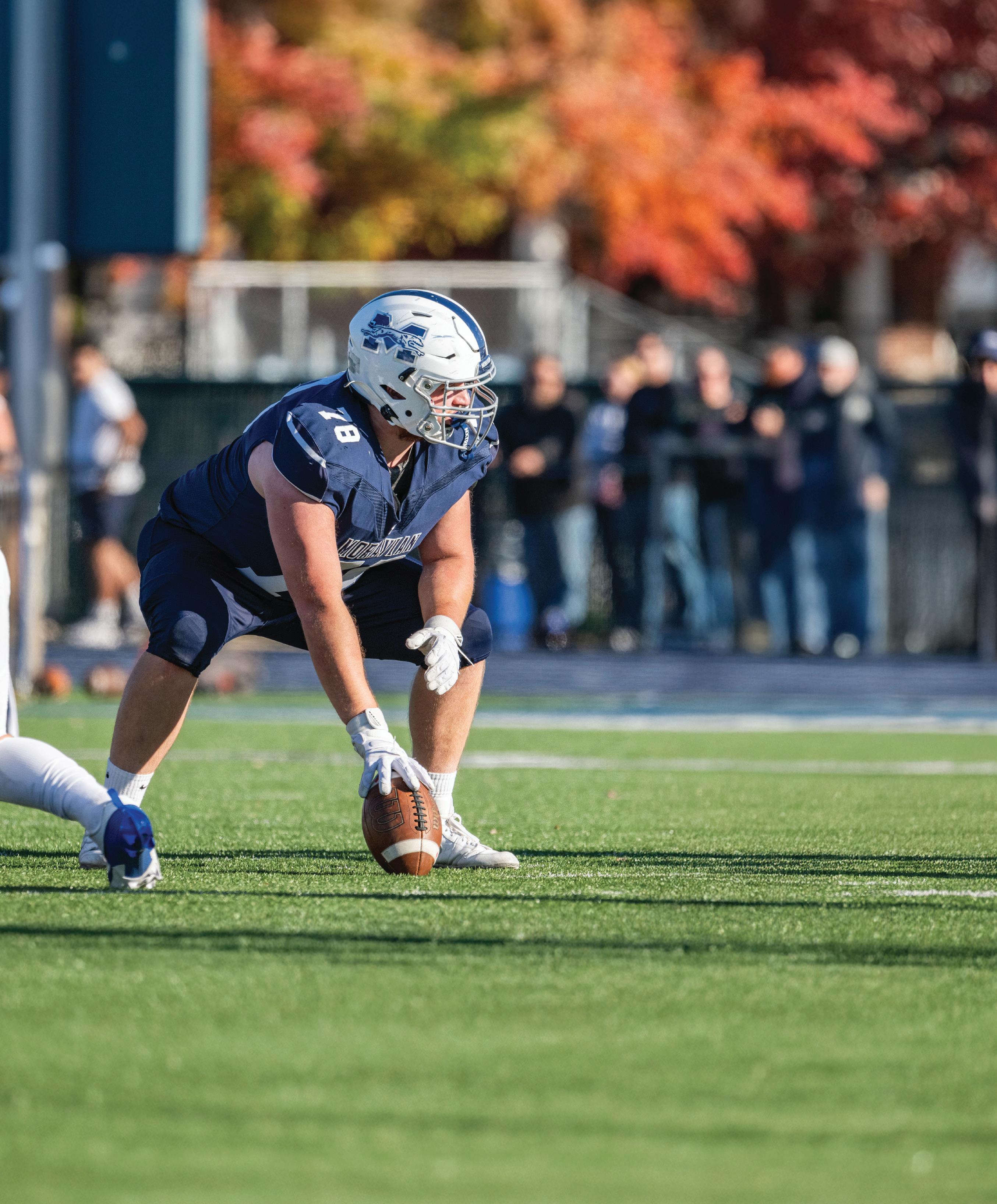
Fresh off their first bowl win in more than a decade, the Greyhounds are gearing up for an even bigger 2025 season, and you can be part of it.
Friday, September 5 | 7 p.m. at Muhlenberg College
Saturday, September 13 | 1 p.m. at Rowan University
Saturday, September 20 | 1 p.m. vs. Ursinus College
Saturday, September 27 | 1 p.m. vs. William Paterson University
Saturday, October 4 | 1 p.m. at Lycoming College
Saturday, October 11 | 1 p.m. vs. Wilkes University HOMECOMING & REUNION WEEKEND
Saturday, October 18 | 12 p.m. at The Catholic University of America
Saturday, October 25 | 1 p.m. vs. Western Connecticut State University FAMILY DAY
Saturday, November 8 | 12 p.m. at Juniata College
Saturday, November 15 | 12:30 p.m. vs. Susquehanna University
Join us in lighting the way for our student-athletes by giving a gift to the Blue & Grey Fund. Your generosity enhances every varsity athletic program and directly supports key areas such as leading-edge facilities, strength and conditioning, nutrition, team travel, and more—everything that powers an unforgettable Greyhound experience. Learn more and give your gift at moravian.edu/blueandgrey
